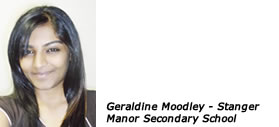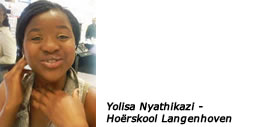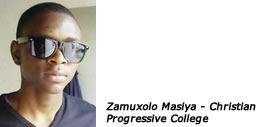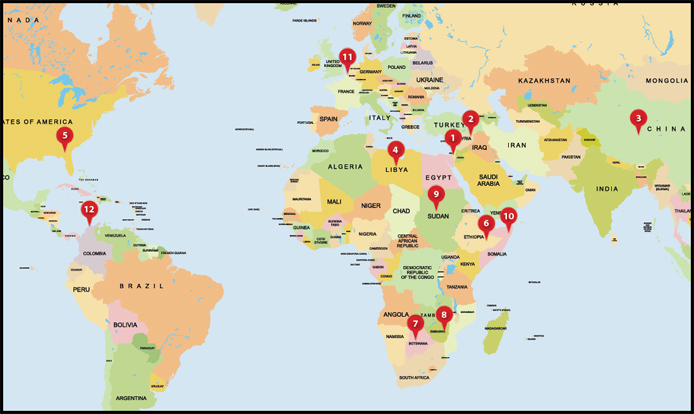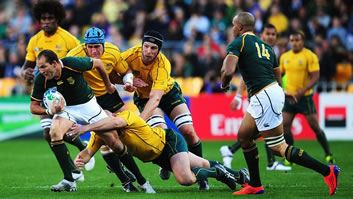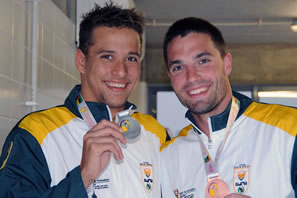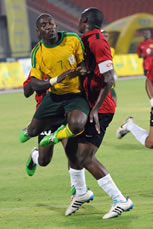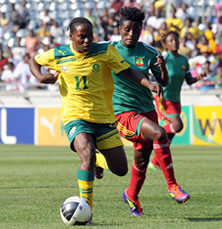Dec 2011
Dec 2011 Estelle Greeff
Putting SA's young people to work
Putting SA's young people to work Estelle GreeffAbout 600 000 matrics will complete their schooling this month. But what are their chances of finding employment? More than 40 per cent of young people under the age of 30 are jobless, compared with less than 17 per cent of adults over 30. Government has therefore devised a number of employment programmes specifically targeting youth in both urban and rural areas.
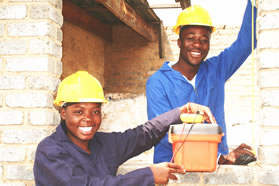 Job-creation, particularly to address unemployment among young people, remains one of the key priorities of President Jacob Zuma’s administration.
Job-creation, particularly to address unemployment among young people, remains one of the key priorities of President Jacob Zuma’s administration.
This is in view of the fact that only one in eight working-age adults in South Africa under 25 years have a job compared with 40 per cent in most emerging economies.
Since December 2008, employment of youth between 18 and 24 years old has fallen by more than 20 per cent (320 000).
Unemployed young people tend to be less skilled and inexperienced with almost 86 per cent lacking further training or tertiary qualifications, while two-thirds have never worked.
G20 Summit
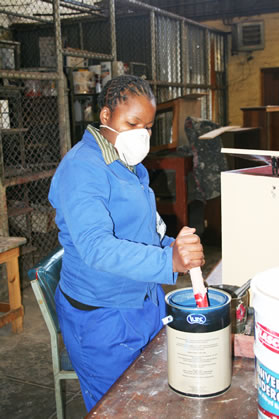 On returning from the G20 Summit in France recently, President Jacob Zuma said South Africa was pleased with the Summit’s commitment to renew efforts to combat unemployment and promote decent jobs. G20 leaders made a commitment that especially youth and others most adversely affected by the global financial crisis would receive special attention.
On returning from the G20 Summit in France recently, President Jacob Zuma said South Africa was pleased with the Summit’s commitment to renew efforts to combat unemployment and promote decent jobs. G20 leaders made a commitment that especially youth and others most adversely affected by the global financial crisis would receive special attention.
“The focus on job creation is in line with South Africa’s own domestic focus on economic transformation to promote inclusive growth and decent jobs,” said the President.
Government has developed a number of employment programmes specifically targeting youth. These include the Community Work Programme (CWP) run by the Department of Cooperative and Traditional Affairs and the National Rural Youth Service Corps programme run by the Department of Rural Development and Land Reform.
Training
Cabinet has agreed to increase the Community Work Programme to a million positions over the next two years. Currently, 80 per cent of participants in the programme are young people. The overall goal of the CWP is to reach one in five young people struggling to find jobs.
The Department of Rural Development and Land Reform’s Youth Service Corps has seen more than 7 500 young people drawn from different wards in rural areas being trained for two years.
The aim is to nearly triple this number to 20 000 in collaboration with the Department of Defence.
EPWP
![Government is making great strides in creating jobs specifically targeted at the youth. Government is making great strides in creating jobs specifically targeted at the youth. [Photos: Kululama Chauke & NYDA]](/sites/default/files/images2011_12/p1_plaster.jpg) The Expanded Public Works Programme (EPWP) continues to create jobs for youth. Last year, the programme created job opportunities for 120 000 people and this is set to increase to 180 000 by next year.
The Expanded Public Works Programme (EPWP) continues to create jobs for youth. Last year, the programme created job opportunities for 120 000 people and this is set to increase to 180 000 by next year.
The Department of Water Affairs in cooperation with the Department of Environmental Affairs have also established a number of programmes under the EPWP, which target youth and unemployed rural people.
Working on Fire and Working for Water are programmes aimed at conserving water, preventing veld fires and protecting the environment through the removal of invasive alien species. Last year, more than 100 000 people participated, with the number expected to double by 2012.
Internships
The Department of Basic Education, through its Kha Ri Gude Mass Literary Campaign, runs the largest employment programme involving close to 40 000 young volunteers. This year alone, they provided Adult Basic Education and Training to more than 600 000 learners.
Government is also establishing internships equal to five per cent of the Public Service by 2013 targeting unemployed qualified graduates.
As a first stage, the number of interns in the Public Service will be increased to three per cent or around 40 000 positions in the new year in 2012. This will take the number of interns in the Public Service to more than five times the current levels.
Internship is a planned, structured, and managed programme that provides work experience for a specific period varying from three to 12 months. It gives students workplace experience and the opportunity to practice the work skills they have studied. This will increase their chances of finding permanent jobs.
On course to meet priority targets
On course to meet priority targets Estelle Greeff2011 Year of Performance
It was a little more than 10 months ago that President Jacob Zuma made certain promises during his State of the Nation Address. To date, government is on course to live up to these promises, particularly in the five priority areas announced in May 2009. These include fighting crime, creating jobs, improving the health system, better education for all and rural development.
Earlier this year, President Jacob Zuma held two separate talks with organised business and labour to find solutions to creating jobs, particularly for the youth, as they make up the majority of the unemployed.
During the mid-year July Cabinet Lekgotla, it was decided to set up two commissions responsible for job creation and infrastructure development. The two commissions are chaired by President Zuma and Deputy President Kgalema Motlanthe along with several ministers in charge of the key portfolios of job creation and infrastructure development making up the rest of the commissions.
As of September this year, remarkable progress had been made in various job-creation programmes. This was jointly carried out by various departments with the help of state-owned companies and development finance institutions, such as the Industrial Development Corporation.
On course to meet priority targets: Job creation
On course to meet priority targets: Job creation Estelle Greeff2011 Year of Performance
One of government’s recent job-creation programmes is the Department of Transport’s S’hamba Sonke Programme. This R22 billion initiative, launched in April this year, will create more than 66 000 job opportunities. Already, an amount of R6,4 billion has been set aside for the present financial year.
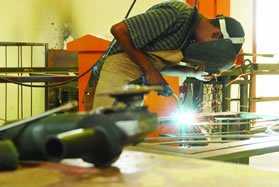 In addition, up to 64 000 new jobs have been created in addition to the 41 000 jobs created in the informal sector, according to the Department of Economic Development. These new job opportunities are as a result of government’s job-creation plan, known as the New Growth Path.
In addition, up to 64 000 new jobs have been created in addition to the 41 000 jobs created in the informal sector, according to the Department of Economic Development. These new job opportunities are as a result of government’s job-creation plan, known as the New Growth Path.
In the agricultural sector, the national and provincial departments are currently providing support to more than 100 000 smallholder farmers.
The Department of Water Affairs and the Department of Environmental Affairs have also created 30 000 jobs through their various programmes, which form part of the Expanded Public Works Programme (EPWP). This number is expected to double during the next financial year. Among these programmes are the Working for Water, Working on Fire, Working for Wetlands, the Invasive Alien Species Removal Programme and Land Care Programme.
The Department of Cooperative and Traditional Affairs through its Community Works Programme has created 89 689 jobs in 45 municipalities.
The Department of Higher Education and Training along with the Departments of Labour and the Department of Economic Development have joined the private sector and signed a national skills accord. The accord binds government and its social partners (organised labour and business) to increase training. In addition, the accord commits the three parties (government, labour and business) to grow the skills base of the economy.
In terms of the accord, up to 30 000 new artisans will be trained during the present financial year with government taking 31 per cent, while state-owned companies will take about 13 per cent. The remaining 56 per cent will be trained by the private sector. Between this year and 2015, state-owned companies such as Eskom and Transnet will train at least 20 000 people as apprentices and learners.
Apart from these programmes, the Department of Public Works’ EPWP has resulted in jobs for more than 308 000 people since the beginning of the present financial year in April. These jobs, in the infrastructure development sector, form part of Phase Two of the EPWP.
On course to meet priority targets: Rural development
On course to meet priority targets: Rural development Estelle Greeff2011 Year of Performance
In May 2009, the newly elected administration set up a new department called the Department of Rural Development and Land Reform to create viable, just and sustainable rural communities.
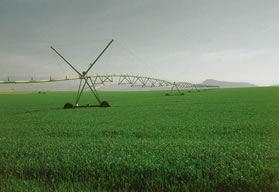 In August of the same year, the department launched government’s Comprehensive Rural Development Programme (CRDP) at Muyexe Village outside Giyani in Limpopo. Since then, an additional 64 CRDP sites have been set up in the Eastern Cape, KwaZulu-Natal, the Free State, Mpumalanga and the Western Cape.
In August of the same year, the department launched government’s Comprehensive Rural Development Programme (CRDP) at Muyexe Village outside Giyani in Limpopo. Since then, an additional 64 CRDP sites have been set up in the Eastern Cape, KwaZulu-Natal, the Free State, Mpumalanga and the Western Cape.
Government also bought 33 560 hectares of agricultural land to provide farmers with land to increase productivity and ensure food security for the rural communities.
In addition, the department took over 116 farms that had been given to beneficiaries of the land restitution programme to redevelop them so that they could become productive again.
This was done through the department’s Recapitalisation and Development Programme. The aim of the programme is to make land reform projects more productive. To date, it is being carried out on more than 170 farms across the country. Thanks to the programme, more than 1 300 permanent and more than 2 700 short-term jobs have been created.
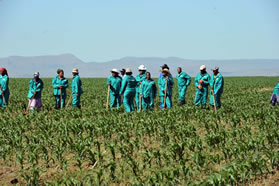 The department also provided jobs for more than 7 900 rural young people from different wards in various municipalities through its National Rural Youth Service Corps (NARYSEC).
The department also provided jobs for more than 7 900 rural young people from different wards in various municipalities through its National Rural Youth Service Corps (NARYSEC).
These young people receive a monthly allowance of R1 320 and are trained by the Department of Defence in various disciplines. These include disaster management, construction and information management, household profiling, as well as skills development.
To assist families that do not have enough food, more than 6 500 households were given seeds and implements to start vegetable gardens. In addition, the Department of Social Development has been providing food to 10 600 households through its food distribution programmes in the form of food vouchers.
On course to meet priority targets: Education
On course to meet priority targets: Education Estelle Greeff2011 Year of Performance
To improve numeracy and literacy at primary school level, the Department of Basic Education introduced workbooks in schools last year. This year, the numeracy and literacy workbooks were made available to all primary schools. Through this project, the department gives resource support to 6,5 million learners and approximately 180 000 teachers in close to 20 000 schools.
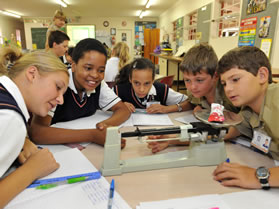 For the foundation phase, the department completed the Curriculum and Assessment Policy Statements (CAPS), which will be incorporated into Grade 10 in 2012. The department has trained subject advisors and the provinces are continuing to train teachers. Starting next year, the department will be implementing CAPS in the foundation phase and grade 10.
For the foundation phase, the department completed the Curriculum and Assessment Policy Statements (CAPS), which will be incorporated into Grade 10 in 2012. The department has trained subject advisors and the provinces are continuing to train teachers. Starting next year, the department will be implementing CAPS in the foundation phase and grade 10.
In February this year, more than 6,5 million learners in Grade 1 to 6 and Grade 10 participated in the Annual National Assessments (ANA). The main aim of the assessments was to test learners’ literacy and numeracy skills. The department also wanted to find out what had to be done to ensure that all learners fulfilled their academic and human potential. At the release of the ANA results in July, it was pointed out that the results meant that the education sector needed to focus even more on its main business – quality learning and teaching.
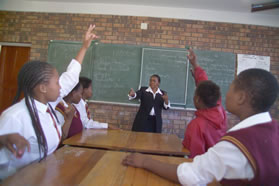 During the present financial year, the conditional grant of the National Schools Nutrition Programme (school feeding scheme) was increased to R915 million, mainly to cater for the implementation in secondary schools with learners from needy backgrounds.
During the present financial year, the conditional grant of the National Schools Nutrition Programme (school feeding scheme) was increased to R915 million, mainly to cater for the implementation in secondary schools with learners from needy backgrounds.
For the next four years, the department has set itself a target of training at least 8 000 principals and deputy principals for the Advanced Certificate in Education: School Leadership and Management.
On higher education, the Department of Higher Education and Training finalised and adopted the revised Sector Education and Training Authorities (SETAs) structure and the National Skills Development Strategy 3 (NSDS3).
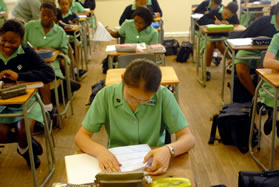 The strategy is being implemented through the country’s main skills development structures. It is the first NSDS to be formulated by the Department of Higher Education and Training, which took over the responsibility for skills development from the Department of Labour.
The strategy is being implemented through the country’s main skills development structures. It is the first NSDS to be formulated by the Department of Higher Education and Training, which took over the responsibility for skills development from the Department of Labour.
In a bid to making higher education more affordable, the department implemented several changes in the National Student Financial Aid Scheme (NSFAS). In future, NSFAS will not start charging interest on student loans until 12 months after a student has graduated or left university. This will apply to all the students.
In addition, a further R50 million has been provided for postgraduate students who require financial assistance to complete their honours, masters and doctoral degrees. These students will enter into loan agreements with the NSFAS and the money they pay back will be used to fund future postgraduate students.
On course to meet priority targets: Infrastructure development
On course to meet priority targets: Infrastructure development Estelle Greeff2011 Year of Performance
One of the programmes government uses to stimulate the economy is infrastructure development. At present, President Jacob Zuma chairs the Infrastructure Development Commission which oversees all major national projects. This includes monitoring their budgets and making sure that the projects are carried out. It also aims to improve the delivery of infrastructure.
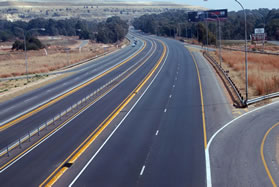 To date, around 60 new regional bulk water-supply infrastructure projects have been undertaken in different parts of the country. These include water treatment works, water supply schemes and wastewater treatment works.
To date, around 60 new regional bulk water-supply infrastructure projects have been undertaken in different parts of the country. These include water treatment works, water supply schemes and wastewater treatment works.
These projects will also provide access to clean drinking water and sanitation. In his the State of the Nation Address, President Zuma mentioned two complaints he had received from residents of Bekkersdal, west of Johannesburg, and Umzimkhulu in southern KwaZulu-Natal. These residents were unhappy about the lack of service delivery in their respective areas.
In response, President Zuma promised to address their complaints. In Umzimkhulu, the existing 2,8 km sewerage pipeline is being upgraded and 41 new manholes and mechanical screens are built to prevent blockages. In May last year, a new water treatment plant was opened. The plant also supplies water to new areas benefitting more than 38 000 people.
 Also at Umzimkhulu, two reservoirs are under construction to increase the town’s storage capacity, while improving water pressure and supply.
Also at Umzimkhulu, two reservoirs are under construction to increase the town’s storage capacity, while improving water pressure and supply.
At the Thutlwane Water Scheme in the Ratlou Local Municipality in North West, the existing system of water supply of Setlagole including Thutlwane and Setlhwatlhwe villages was upgraded by three borehole projects. The boreholes are supplying a population of 22 835. This means a basic service level is met to provide each person with 25 litres of water per day within a walking distance of 200 m from each household.
In Bekkersdal, Gauteng, the Provincial Government has set aside R75 million for the Bekkersdal Urban Renewal Project. The national Department of Cooperative Governance in cooperation with the Department of Human Settlements working with the Gauteng Provincial Government have declared Bekkersdal a Priority Project. Several projects including provision of houses, water and sanitation, as well as other community amenities will be carried out in Bekkersdal.
On course to meet priority targets: Safety and security
On course to meet priority targets: Safety and security Estelle Greeff2011 Year of Performance
As was indicated at the annual release of crime statistics in early September, the fight against crime is showing positive results. There was a 5,75 per cent reduction for serious crimes in 2011 compared to the same period of 2010.
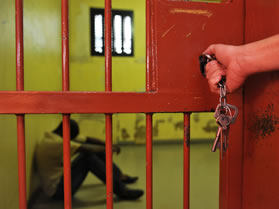 As was indicated at the annual release of crime statistics in early September, the fight against crime is showing positive results. There was a 5,75 per cent reduction for serious crimes in 2011 compared to the same period of 2010.
As was indicated at the annual release of crime statistics in early September, the fight against crime is showing positive results. There was a 5,75 per cent reduction for serious crimes in 2011 compared to the same period of 2010.
In addition, a survey by the Government Communication and Information System (GCIS) indicated that South Africans were feeling safer. The survey found that the number of respondents who see crime as a major challenge is gradually going down. Currently, the number of respondents who view crime as a major challenge in South Africa has gone down from 33 per cent to 25 per cent.
A 9,65 per cent reduction was achieved for contact crimes in 2011 compared to the same period in 2010. Close to 55 000 arrests were made.
During the present financial year, the Department of Justice and Constitutional Development in collaboration with the Department of Correctional Services introduced the first phase of the remand video system, which concentrated on the high volume of correctional centres and associated courts. Video remand uses videoconferencing for routine bail and remand hearings without the suspects having to leave their place of detention.
So far, 47 courts and 22 correctional centres have been equipped with the video remand system. Of the 47 courts, 17 are already operational. By the end of September 2011, 27 courts were using the system. Of the 22 correctional centres, 10 are operational.
The Department of Correctional Services has also started to introduce new generation mother and child facilities: The department is relocating women offenders with babies in correctional centres to new-generation mother and child facilities with more suitable environments for child development. Such facilities have been opened in Cape Town and Durban. Similar facilities in other centres will soon follow.
The Department of Justice and Constitutional Development has successfully implemented Phase One of the National Register of Sex Offenders. This register is intended to protect children and the mentally disabled from those who have been convicted of sexual offences.
All court orders that relate to convictions of this crime under the new Sexual Offences Act continue to be captured in the register. There has been an increase in the number of sex offenders registered from 1 202 to 1 612 until August this year.
On course to meet priority targets: Health
On course to meet priority targets: Health Estelle Greeff2011 Year of Performance
In his State of the Nation Address, President Zuma announced that government would start setting up the National Health Insurance (NHI) in order to extend quality healthcare to all South Africans.
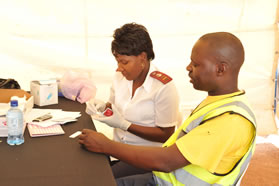 In preparation to the launch of the NHI, the Department of Health has completed an audit of the identified health institutions or sites in 10 districts across the country where the NHI will be piloted first. To this end, the department has published the Green Paper on NHI for comment and a human resource strategy for health has been unveiled. Treasury has set aside R500 million for NHI.
In preparation to the launch of the NHI, the Department of Health has completed an audit of the identified health institutions or sites in 10 districts across the country where the NHI will be piloted first. To this end, the department has published the Green Paper on NHI for comment and a human resource strategy for health has been unveiled. Treasury has set aside R500 million for NHI.
On HIV and AIDS, the Department’s HIV Counselling and Testing campaign had, by last June, reached almost 15 million people. The majority (13 million) had been tested at public health facilities.
A vision for 2030
A vision for 2030 Estelle GreeffNational Development Plan 2030
More than a year ago, President Jacob Zuma appointed 25 prominent South Africans with expertise in various disciplines to make up the National Planning Commission (NPC). At the time the commission was set up, President Zuma said it was government's promise to the people of South Africa that government would build a state that would grow the economy, reduce poverty and improve the quality of life of all South Africans.
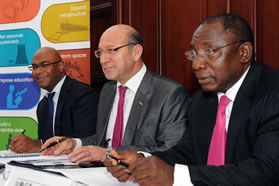 Earlier this year, the NCP released its report identifying challenges which slow down South Africa’s growth such as poverty and inequality. The report looks at ways to address the challenges as captured in the commission’s Vision 2030 mission statement.
Earlier this year, the NCP released its report identifying challenges which slow down South Africa’s growth such as poverty and inequality. The report looks at ways to address the challenges as captured in the commission’s Vision 2030 mission statement.
Last month, the commission publicly presented its National Development Plan (NDP), which aims to encourage citizens and communities to be part of their own development instead of passively relying on handouts from government.
The Minister in the Presidency responsible for the NPC, Trevor Manuel, and NPC deputy chairman Cyril Ramaphosa, presented the plan to President Zuma and Deputy President Kgalema Motlanthe.
Challenges
Challenges identified in the plan include unemployment, failing infrastructure, South Africa’s economy relying too much on mineral resources, poor education, economic divisions created by apartheid planning, many poor communities being at the risk of contracting diseases because of the failing public health system, a poor public service and corruption.
To address the above, the NDP suggests the creation of 11 million jobs, increased infrastructure development, using mineral resources to benefit everyone while at the same time making sure that such resources can be used in the long-term.
The NDP further suggests a radical improvement in the state of education, as well as the provision of quality healthcare for all South Africans.
The plan also suggests that the Public Service should be strengthened so that it could meet the challenges faced by the country and respond accordingly.
The NDP recommends that corruption must be eradicated and that there should be ongoing efforts to unite the divided nation into one united nation.
Build a capable state
- Fix the relationship between political parties and government officials.
- Make the Public Service a career of choice
- Improve relations between national, provincial and local government.
- Boost state-owned enterprises to help build the country.
- Professionalise the police and criminal justice system.
Fight corruption
- Centralise the awarding of large tenders or tenders that go for a long time.
- Take political and legal steps to stop political interference in agencies fighting corruption.
- Set up dedicated prosecution teams, specialist courts and judges.
- Make it illegal for civil servants to run or benefit directly from certain types of business activity.
Transformation and unity
- The Bill of Responsibility, developed by the Department of Basic Education and others, should be popularised and used as a pledge by all South Africans to live the values of the Constitution.
- Encourage all South Africans to learn at least one African language.
- Employment equity and other redress measures should continue and be made more effective.
The plan includes the following suggestions:
Job-creation
- Expand the public works programme.
- Lower the cost of doing business and costs for households.
- Help match unemployed workers to jobs.
- Provide tax subsidy to businesses to reduce cost of hiring young people.
- Help employers and unions agree on starting salaries.
- Make it possible for very skilled immigrants to work in South Africa.
- Make sure that probationary periods are managed properly.
- Simplify dismissal procedures for performance or misconduct.
- Reward the setting up of new businesses, including partnering with companies.
- Increase value for money for tourists by selling regional packages that meet all pocket sizes. Consider a single visa for SADC visitors.
Infrastructure development
- Invest in a new heavy-haul rail corridor to the Waterberg coal field and upgrade the central basin coal network.
- Enable exploratory drilling to see whether there are viable coal seam and shale gas reserves, while investigations continue to make sure that operations do not damage the environment.
- Move Eskom's system operator, planning, power procurement, power purchasing and power contracting functions to the independent system and market operator.
- Closely regulate the electricity maintenance plans of large cities.
- Set up an investment programme for water resource development, bulk water supply and wastewater management this year, with reviews every five years.
- Fix and build transport links, in these key areas:
- Upgrade the Durban-Gauteng freight corridor and build a new port at the old Durban airport site
- Expand the coal, iron ore and manganese lines.
- Build the N2 road through the Eastern Cape.
- Upgrade the Sishen to Saldanha iron ore line and expand capacity on the manganese line (including port capacity).
- Improve and cut the cost of Internet broadband by changing the regulatory framework.
Renewable and other alternative forms of energy:
- Speed up and expand renewable energy and waste recycling, and ensure buildings meet energy-efficient standards.
- Set a target of five million solar water heaters by 2030.
- Introduce a carbon tax.
Transform urban and rural spaces
- Stop building houses on poorly located land and shift more resources to upgrading informal settlements, provided that they are in areas close to jobs.
- Improve public transport.
- Give businesses incentives to move jobs to townships.
- Fix the gap in the housing market by combining what banks have to offer with subsidies as well as employer housing schemes.
- Give communal farmers, especially women, security of tenure.
- Put money into irrigation in Makhathini Flats and Umzimvubu River Basin.
Education and training
- Make sure all children have two years of pre-school.
- Get rid of union and political interference in appointments and appoint only qualified people.
- Increase teacher training output by expanding "Funza Lushaka" to attract learners into teaching, especially those with good passes in maths, science and languages.
- Regularly test teachers in the subjects they teach to determine their level of knowledge and competence. Link teacher pay to learner performance improvements.
- Good schools should not be burdened with the paperwork that poor performing schools have to do to improve. Schools performing very poorly should receive the closest attention.
- Change the process of appointment of principals and set minimum qualifications.
- Gradually give principals more powers to run schools, including financial management, procurement of textbooks and other educational material, as well as hiring and firing educators.
- Increase the number of university graduates and the number of people doing their doctorates.
- Build two new universities, one in Mpumalanga and one the Northern Cape.
- Build a new medical school in Limpopo and a number of new academic hospitals.
- Consider extending the length of first degrees to four years on a voluntary basis.
- Provide full funding assistance covering tuition, books, accommodation and living allowance in the form of loans and bursaries to deserving students.
- Grant seven-year work permits to all foreigners who graduate from a registered South African university.
Quality healthcare
- Broaden coverage of antiretroviral treatment to all HIV-positive people.
- Speed up training of community specialists in medicine, surgery including anaesthetics, obstetrics, paediatrics and psychiatry.
- Recruit, train and deploy between 700 000 and 1,3 million community health workers to implement community-based healthcare.
- Set minimum qualifications for hospital managers and ensure that all managers have the necessary qualifications.
- Implement national health insurance in a phased manner.
- Promote active lifestyles and balanced diets, control alcohol abuse and health awareness to reduce non-communicable diseases.
For more information or to comment on the plan:
- e-mail:
comments@npconline.co.za
- Tel:
012 308 1781, 086 683 5479
- Twitter:
@npcSA / http://www.twitter.com/npcSA
- Facebook: http://www.facebook.com/npcSA
- Physical address:
Union Buildings, Private Bag X1000, Pretoria, 0001
- Youtube: http://www.youtube.com/user/NPCZA
Infrastructure gets a whopping slice of the budget
Infrastructure gets a whopping slice of the budget Estelle GreeffMid-term Budget
In line with Government’s priority to fight poverty and create jobs, budget allocation for the next three years will see an increase in infrastructure spending, said Finance Minister Pravin Gordhan.
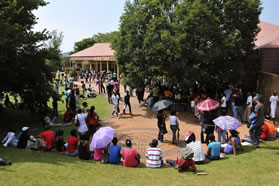 Minister Gordhan, who delivered his Mid-term Budget speech in October, said government expected to get R729 billion income from taxes. However, this amount fell short by R13 billion compared to the amount that had been expected when he presented the Budget for the 2011/2012 financial year last February.
Minister Gordhan, who delivered his Mid-term Budget speech in October, said government expected to get R729 billion income from taxes. However, this amount fell short by R13 billion compared to the amount that had been expected when he presented the Budget for the 2011/2012 financial year last February.
The Minister said the budget shortages required that salary negotiations in the Public Service for the next three years would take government’s limited financial resources into account.
He said this also applied to the increments to Cabinet members and senior management in the Public Service and executives in state-owned companies.
Investment programme
During the 2012/2013 financial year, government will be spending over one trillion rand. Of this amount, R802 billion will be used for infrastructure spending starting with R233 billion during the present financial year.
“This is a very substantial investment programme, within which there is considerable opportunity for local construction, manufacturing development and job creation,” said Minister Gordhan.
He added that government would be spending R292 billion in the energy sector from 2012 to 2015. This amount includes the funding for the building of the Kusile and Medupi power stations, the building of wind farms for alternative sources of energy and the installation of solar power geysers across various municipalities countrywide.
Transport and logistics
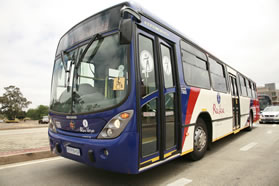 The Minister added that R226 billion would be spent on transport and logistics. This will include the buying of new commuter train coaches for Metrorail and replacing the old signal system. It will also be used for continued investment in the construction and rehabilitation of national and provincial roads.
The Minister added that R226 billion would be spent on transport and logistics. This will include the buying of new commuter train coaches for Metrorail and replacing the old signal system. It will also be used for continued investment in the construction and rehabilitation of national and provincial roads.
The Medium-term Budget has also set aside R39 billion for the construction of new hospitals and other health facilities in preparation for the rolling out of the National Health Insurance (NHI), which is aimed at providing quality healthcare for all South Africans.
Education
Government will be spending R32 billion on several infrastructure programmes for education. These include new schools, two universities in Northern Cape and Mpumalanga, as well as two medical universities.
Several infrastructure development programmes will be established in provinces and municipalities. These will include housing, residential infrastructure and local economic development.
Government has – on top of the additional allocations for wages – set aside R3,8 billion of unspent money that had been rolled over from last year. This was set aside to fund infrastructure projects which includes R200 million for improving health facilities, and R105 million for the COP17 Climate Change Conference taking place in Durban this month.
Infrastructure programmes
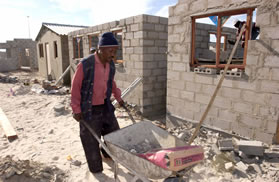 Minister Gordhan said funding for infrastructure projects would be in the following areas:
Minister Gordhan said funding for infrastructure projects would be in the following areas:
- R150 million to help farmers recover from the damage caused by flooding in the beginning of the year and the harm caused by livestock diseases.
- R814 million for the Department of Defence to fight piracy in the Mozambican sea route in cooperation with the Mozambique Defence Force.
- An amount of R266 million will be paid to outgoing councillors following this year’s municipal elections.
- R208 million is allocated to meet urgent needs linked to the damage caused by contaminated water with acid from unused mines in Gauteng to address the region’s water supply needs over the long term.
- R752 million goes to provinces for various conditional grants, including allocations for the repair of flood-damaged infrastructure.
He added that for the next three years, the Police Department would be getting 7,4 per cent each year to fight crime. The Expanded Public Works Programmes aim to create 3,4 million job opportunities over the next three years.
The recently established Community Works Programme will be expanded to about 250 000 participants by 2014/15. Education remains the largest priority in government spending. It accounts for over 20 per cent of non-interest allocations, and will rise to R232 billion in 2014/15.
Health spending is set to increase by 7,4 per cent a year, from R113 billion this year to R140 billion in three years’ time. This includes the NHI pilot projects in 10 districts focused on comprehensive primary health care.
Spending on local government, housing and community amenities will rise from R122 billion to R146 billion over the next three years, including targeted funding for upgrading informal settlements in 45 cities and towns.
Of the R48 billion available for allocation in the 2012 Budget, 42 per cent goes to provinces and 11 per cent to local government.
Road safety – a debatable point
Road safety – a debatable point Estelle GreeffLearners recently had an opportunity to air their views about the state of road safety in South Africa at the 2011 National Road Safety Schooling Debate Competition. Road safety is an issue that affects all learners as many of them have experienced their school peers, friends or family members being injured or killed in road accidents.
The competition was hosted by the Road Traffic Management Corporation (RTMC) together with the KwaZulu-Natal Department of Transport, the national Department of Basic Education, Transnet, BP South Africa and the Road Accident Fund to raise awareness and change attitudes about road safety.
The Road Safety Debate is a national programme aimed at secondary school learners.
Objectives
The objectives of the competition is:
- to empower learners with road safety knowledge by doing research on road safety topics
- to enhance learners public speaking and analytical skills as they have to debate and respond to points of information
- to encourage learners to work in teams and define their roles as a collective
- to improve listening skills, especially in the rebuttal phase of the competition.
- to create a sense of responsibility and develop leadership skills.
Decade of action
Teams from schools throughout the country debated on increased awareness of road safety risk factors and ways to prevent acci-dents. The topic for the finals was “South Africa will reduce road fatalities by 50 per cent by 2020 as per the Decade of Action on Road Safety”. The Decade of Action 2011-2020 campaign is an international road safety awareness campaign, supported by government throughout the world.
According to RTMC Acting CEO Collins Letsoalo, the death of school children and pedestrians on our roads is alarming. He said initiatives such as the debate would go a long way to meet the target of reducing accidents and ultimately making our roads safer.
“We request the youth to internalise sound road safety norms and values and we make an impassionate plea to them to embrace a culture of safe road usage.
“We also urge the youth as road users not to passively accept unacceptable and indeed criminal actions on our roads. The blatant disregard of the law should not be tolerated. Help us partake in our struggle to prevent road collisions. Make it your responsibility to be safe on our roads,” he added.
The first prize went to the Mafikeng High School in the North West.
High hopes for the Class of 2011
High hopes for the Class of 2011 Estelle Greeff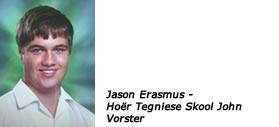 Jason Erasmus,
Jason Erasmus,
Hoër Tegniese Skool John Vorster
I would like to study Quantity Surveying at the University of Pretoria next year. I’m looking forward to the student life that awaits me. My dream is to succeed in my profession as quantity surveyor and have my own company one day. I would like to encourage every matric student to do his or her best with the exams, because your future depends on it. Remember, dream your dream, no one can take it away from you!
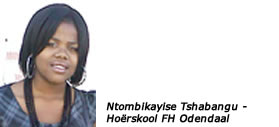 Ntombikayise Tshabangu,
Ntombikayise Tshabangu,
Hoërskool FH Odendaal
I have a choice to study either at Midrand Graduate Institute or go to Tshwane University of Technology to study Information Technology. I’m looking forward to new challenges as a first-year tertiary student and attending my lectures where studying will be my own responsibility. I’m excited about meeting people from different walks of life and getting to know more about the diversity of Mzansi.
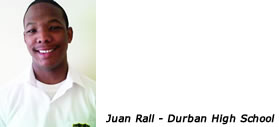 Juan Rall,
Juan Rall,
Durban High School
I would like to be an electrical engineer. I’m going to study at an electrical training academy in Umbilo, Durban. I’m very excited about the new year because 2012 means I’m going to be finished with school and I’m hoping it will be a good year for me. After studying I want to explore new possibilities within the electrical field and hopefully start my own business one day
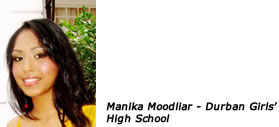 Manika Moodliar,
Manika Moodliar,
Durban Girls’ High School
Next year, I ‘m going to the University of Cape Town to do a Bachelor of Science degree. I wish to major in Astrophysics and I hope to one day go into research after doing my honours and masters – and even PhD, who knows!!
Geraldine Moodley,
Stanger Manor Secondary School
There are so many career choices that inspire me especially Occupational Therapy. So I have decided to take a break in 2012 and go on a soul-searching journey. As young as I am, I find myself being a very diverse person. I want to know who I am and discover my true passion before I start university; the stepping stone to my future.
Yolisa Nyathikazi,
Hoërskool Langenhoven
I’m super excited about 2012 because I’ll be focusing on the thing I love most, professional make-up design. I will be studying at Kohl make-up academy in Johannesburg and after that I will be studying research and development because I want to start my own make-up line for black skin. For me, next year is the year I make my dreams come true with hard work all the way.
Zamuxolo Masiya,
Christian Progressive College
To me, leaving high school is a 12-year chapter that I invested in and it’s been an adventure. It’s said that “No matter how much you hate high school you’ll miss it when you leave” and I’m going to miss it. But it’s about time I use living organisms to enhance crops, fuel, medical treatment and host tools that can and will help humans as I will be enrolling as a Biotech student. I think varsity life will be exciting.
Bursaries benefit 1 000 learners
Bursaries benefit 1 000 learners Estelle GreeffMore than 1 000 Grade 12 top learners in Gauteng are to benefit from bursaries worth R58 million to help them further their studies at higher education institutions next year. Many of them only dreamed about furthering their studies not believing it would be possible.
The provincial government, through the Gauteng City Region Academy awarded 1 050 bursaries to top learners from no-fee paying schools worth R58 million.
Gauteng Premier Nomvula Mokonyane, said the bursaries demonstrated government’s commitment to education, especially the education of disadvantaged children.
“They remain a key priority as we continue to transform our society and demographic outlook of our economically active citizenry, we hope that this initiative will encourage the ‘Class of 2011’ to work even harder, so that they can also become beneficiaries of this scheme.”
Running to halt abuse
Running to halt abuse Estelle GreeffMaking his voice heard in the fight against abuse of women and children during the 16 Days of Activism Campaign, is 25-year-old Samuel Ntsanwisi.
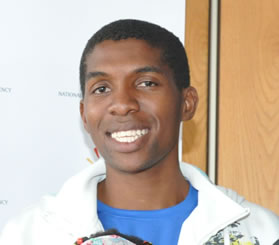 Samuel is a Durban University of Technology graduate who will run across four provinces to raise funds to build a multipurpose centre that will also house an orphanage in his home village in Nkowa-Nkowa in Limpopo.
Samuel is a Durban University of Technology graduate who will run across four provinces to raise funds to build a multipurpose centre that will also house an orphanage in his home village in Nkowa-Nkowa in Limpopo.
His quest will be sponsored by the National Youth Development Agency (NYDA). Seven other runners, including two women and three cyclists, will join him.
“We work with a lot of children and we discovered that too many of them get abused including their mothers. Women and children were not designed to be punching bags but precious gifts to be loved, ” said Samuel.
Along with the others, Samuel will run a total of 1 010 km from Durban to Limpopo for the duration of the 16 Days of Activism Campaign.
COP17 gets closer to communities
COP17 gets closer to communities Estelle GreeffCOP17/CMP7 has made headlines worldwide, but for many people climate change is still an alien concept that does not affect them. Thanks to education campaigns, communities in rural KwaZulu-Natal now realise that climate change is a serious environmental challenge that affects all of us.
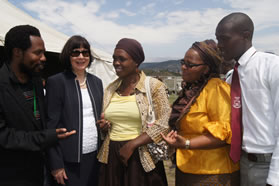 Until recently, people in the uMgungundlovu District of KwaZulu-Natal didn’t know much about COP17 or the effects of climate change. But then the KwaZulu-Natal government backed their climate change education campaigns with action.
Until recently, people in the uMgungundlovu District of KwaZulu-Natal didn’t know much about COP17 or the effects of climate change. But then the KwaZulu-Natal government backed their climate change education campaigns with action.
Climate change is the long-term shift in weather patterns in a specific region or globally. Unlike global warming, which refers to just one aspect of climate change, namely a rise in the earth’s surface temperature, climate change refers to changes in a region’s overall weather patterns, including precipitation (rain, snow, sleet, hail), temperatures, cloud cover, and so on.
Taking action
More than 3 000 people gathered at the Esidadeni Sports Grounds at Mkhambathini to learn more about COP17, which is short for the 17th Session of the Conference of the Parties to the United Nations Framework Convention on Climate Change. It started in Durban on November 28 and closes on 9 December.
The community joined MEC for Finance Ina Cronjé and officials from the Department of Agriculture, Environmental Affairs and Rural Development for lessons on climate change. Residents learned about the harmful effects of climate change and what they could do to lessen the effects.
Putting into practice what they had learned, community members started removing invasive alien plant species in the nearby Msunduzi River and planting idigenous trees at the kwaNyavu Traditional Administration Centre.
Enlightened
Local traditional leader Inkosi, Skhosiphi Mdluli was delighted that the provincial government “enlightened his people”.
“Now we know that we are part of the world; whatever we do here will have an impact on the climate of the whole world,” said Mdluli. “A lot has been said about COP17 on radio and newspapers, but no-one put it into perspective for us at the grassroots level or explained how it affected us as communities. They also didn’t tell us about the role we could play to minimise risk.”
A serious issue
Some community members talked about how the climate change campaign helped them understand the seriousness of the issue.
Namelaphi Mkhize from rural kwaNyavu in Mkhambathini, works for Zibambele - an initiative by the Department of Transport. She said she didn’t know anything about COP17, despite hearing about it on the radio.
But speaking after the event, Mkhize said: “I don’t regret coming to this event because now I have a clear picture of what COP17 is all about. Before the event I thought it was about traffic cops, now it is clear as snow.”
It starts with you
Mkhize said the campaign has taught her that improving the state of the environment starts with her.
“My input towards this initiative will be to minimise on burning unnecessary fire. Now that I know the importance of planting trees, I will make sure that I don’t cut them down; I will rather plant trees especially indigenous trees.”
The campaign also provided Mkhize with a business idea. “When the MEC spoke about recycling used items, she gave me a business idea to recycle most of what would usually go to my rubbish bin. I also decided to make doormats from used plastic bags.”
Future generations
Like Mkhize, Cabangani Majozi a learner at Banqobile High School at Sidadeni, was clueless about COP17.
“I heard about it on TV and radio, but I didn’t know what it is all about, because they didn’t give clear details so that we could understand what it really means,” he said.
The young learner said he now understood that the outcomes of the COP17 would have consequences for his community.
“This is so serious, when I get back home I will tell everyone, even the youth at our sports session, to start saving water. I will visit the Department of Agriculture to get indigenous trees so that we can plant them at home and in my area. I will never litter again and I will ensure that my environment is clean. We have to do this for the sake of ourselves and future generations.”
Meanwhile, Mkhambathini Mayor, Thobekile Maphumulo, said that her council was taking COP17 seriously and she would continue educating people about climate change.
Gifted farmer reaps top title
Gifted farmer reaps top title Estelle GreeffFrom a young age, Gift Mafuleka was determined to become a farmer.
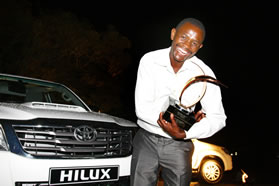 Thanks to a combination of opportunities presented by government and the private sector, Mafuleka’s hard work, passion and dedication has made him the 2011 Toyota New Harvest Farmer of the Year – a title accompanied by a new Hilux Raider.
Thanks to a combination of opportunities presented by government and the private sector, Mafuleka’s hard work, passion and dedication has made him the 2011 Toyota New Harvest Farmer of the Year – a title accompanied by a new Hilux Raider.
Commercial farmer
Mafuleka, from the Metsweding District, Leeuwfontein near Bronkhorstspruit was nominated for the award by the Gauteng Department of Agriculture and Rural Development.
He completed a two-year BTech degree in Crop Production before joining McCain Food SA as a crop manager where he was mentored by the company’s agriculture team over three years.
Through the skills obtained during his time with the company, he was granted a long-term lease on his own farm. He is now a commercial contract farmer to McCain, supplying the company annually with peas and sweet corn.
Passion and commitment
According to Louis Wolthers, Managing Director at McCain, “Gift has sacrificed a secure income in his goal to succeed as a commercial farmer. This award and recognition from external agricultural role-players makes our team very proud of what he has achieved in a relatively short period.
“We know with certainty that with his passion and commitment he will continue to grow from strength to strength. We look forward to having him as a supplier for many years to come.”
Talking about his success, Mafuleka said: “If you are passionate and determined about what you do, you can achieve your dream.”
Mafuleka is one of only few young emerging commercial farmers near Bronkhorstspruit and his farm covers an area of about 342 hectares.
Born in Esikhawini in Richards Bay, KwaZulu-Natal, Gift’s love for farming started when he was only 10 years old. Inspired by his grandfather who was a subsistence farmer in the area. Mafuleka says subsistence farming was the order of the day during his early years.
He now strongly believes that there is a need for more new blood from historically disadvantaged communities in the agricultural community.
Africa talks climate-smart farming
Africa talks climate-smart farming Estelle GreeffCOP17/CMP7 has brought awareness of climate change closer to Africa. It has offered the continent a unique opportunity to influence global decisions about climate change and to establish an agricultural programme based on scientific research.
Climate change is a major environmental challenge that affects the whole world.
According to scientists, the African continent will face intense droughts, famine, disease and floods as a result of climate change. It is also reported that the continent is already warming faster than the global average.
Before COP17, which took place from 28 November to 9 December in Durban, South Africa’s Minister of Agriculture, Forestry and Fisheries, Tina Joemat-Pettersson, convened a two-day African ministerial conference under the theme “Climate-Smart Agriculture: A call to Action.”
What is climate smart agriculture?
Climate-smart agriculture means using farming techniques that release less greenhouse gases into the atmosphere and therefore do not contribute to climate change. It includes proven techniques such as agro-forestry, zero tilling and intercropping among others.
Agro-forestry combines agriculture with forestry so that the land can be used for more than one purpose at the same time. Zero tillage or no-tillage is a farming method in which the seeds are directly deposited into untilled soil which has retained the previous crop residues.
The aim is to move as little soil as possible to prevent weed seeds from coming to the surface and to not stimulate them to germinate. Intercropping is a farming practice in which two or more crops are grown together in the same field.
One voice
One of the aims of the climate-smart agriculture conference was to prepare African ministers responsible for agriculture on the continent to speak in one voice while pushing for climate-smart agriculture at COP17.
Joemat-Pettersson said climate-smart agriculture, which is a fairly new concept in Africa, could help the continent achieve food security.
“African agriculture is vulnerable to climate change; ensuring food security under a changing climate is therefore one of the major challenges in our era.”
International Relations Minister Maite Nkoana-Mashabane said agriculture could cost-effectively reduce greenhouse gases through changes in agricultural technologies and management practices.
“African agriculture is vulnerable to climate change; ensuring food security under a changing climate is therefore one of the major challenges in our era.”
Derrick makes it Fine to live positively
Derrick makes it Fine to live positively Estelle GreeffHe is 53, a teacher, writer, Bachelor of Law graduate and a nephew to one of the country's richest men. He has been an activist in lesbian and gay support organisations, an attorney at a law firm, an education officer at the Constitutional Assembly, a consultant specialising in human rights education materials and a coach specialising in plain language writing and editing.
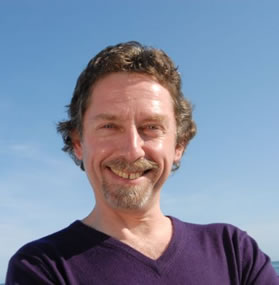 Meet Derrick Fine from Kommetjie just outside Cape Town, who lives unashamed of his HIV status.
Meet Derrick Fine from Kommetjie just outside Cape Town, who lives unashamed of his HIV status.
Derrick has lived with HIV for 12 years, having tested positive in 1999. Instead of feeling sorry for himself and ashamed, he uses his life experience to be a lighthouse in the darkness. Shining a spotlight on the controversial issues around HIV and AIDS in a candid way, he hopes to touch people and make them think about the stigma around people living with HIV.
A shining light
Derrick's story is one of hope, friendship and love."HIV doesn't define me. I don't label myself 'HIV positive'. I talk about 'living with HIV' because it's just one part of who I am as a person," says Derrick who describes testing HIV positive as a jarring wake-up call to a life affirming journey of living, loving and being loved.
Going back to the day he found out about his status, Derrick says his inner voice had already told him he may be HIV positive because he had found out that his partner at the time was HIV positive. The confirmation brought him down to earth with a big bump.
Self-acceptances
The most difficult thing for Derrick was selfacceptance
and self disclosure. "I took the burden on my own shoulders for far too long. Very slowly I developed the strength to begin telling some friends and family. I was only able to do this after self acceptance the first disclosure we make is to ourselves," said Derrick who disclosed to others after two years.
But he says family and friends overwhelmed him with love and support.
"I thought: why didn't I do this earlier? I was asked one or two funny questions, but the support totally outweighed the awkwardness of some people on receiving my news."
Medication
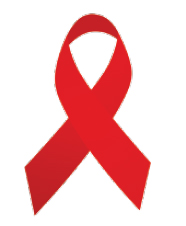 Derrick started taking around 10 ARV tablets a days and now has only one tablet a day the Atripla, a combination of three antiretrovirals, which he has been taking for several years now without any significant side effects.
Derrick started taking around 10 ARV tablets a days and now has only one tablet a day the Atripla, a combination of three antiretrovirals, which he has been taking for several years now without any significant side effects.
He says he thinks of his ARVs as his daily vitamin tablets, which he takes before he goes to sleep every night.
His CD4 count has risen steadily and is now 'normal' in the 800s. But he says it's not just about the CD4 count and having an undetectable viral load through being on ARVs. "The other parts of positive living are also vital, like regular exercise, finding ways to de-stress, a healthy diet, and having love and laughter in your life."
One step at a time
Knowing his status made Derrick regain control of his life. He advises those who find it difficult to disclose their status to take it one step at a time. "You must try to find one person you trust and can open up to, as one disclosure leads to another."
And for those who have recently tested positive, Derrick advises that you must take some time out to accept yourself.
"Don't blame anyone else: it's time to take responsibility for your own life and those who you love by protecting them too. I'm comfortable in my own skin and being myself at all times," says Derrick who is also a trustee at the Openly Positive organisation a non-profit organisation helping to create a more supportive environment for people living with and affected by HIV and AIDS.
Openly positive
Launched in 2007, Openly Positive is helping to build a supportive, stigma-free environment for people living with HIV and AIDS to live
positively and disclose through story telling.
South Africa has more people living with HIV than any other country in the world.
For more information, call the National AIDS Helpline: 0800 012 322. Have a question or need some answers? Contact opositive@iafrica.com
Traditional perspective on HIV
Traditional perspective on HIV Estelle GreeffMany South Africans still prefer to consult traditional healers for health advice and treatment rather than visiting a medical doctor or clinic. The role of traditional healers in providing advice in response to HIV and AIDS is therefore vitally important.
Studies have shown that as many as 70 per cent of our population depends on traditional medicine for primary healthcare, said President Jacob Zuma.
Talking during the recent opening of new test laboratories at the South African Bureau of Standards, President Zuma called for a speeding up of the standardisation of African traditional medicine.
He said the country needed to establish a national standard regarding traditional medicines and to improve the quality control of traditional medicines.
In recognising the important role played by traditional healers in the health care of South Africans, government, through the Department of Health, provides the healers with training. It includes recognising the symptoms of HIV and AIDS, ways to prevent the spread of the disease and counselling of patients who are HIV-positive.
Respect
Traditional healers now encourage their patients to consult healthcare centres for proper diagnosis. They provide counselling and support and ensure that patients take their antiretrovirals (ARVs) regularly.
Speaking to Vuk’uzenzele, Traditional Healers Organisation National Coordinator Phephisile Maseko pointed out that the counselling of patients had become part of the curriculum for traditional healers. This included advice on preventing HIV and encouraging patients to respect their bodies.
Maseko highlights the importance of building trust between a patient and a healer. “If she tells you she is vomiting, has an ulcer, losing weight, has a sore throat and joints, I first ask her, where is your partner?
“I speak with her nicely and tell her that there is another health solution we can embark on. I advise her to go to the clinic for proper diagnosis and assure her that there’s nothing wrong with Western medicine.”
As a result of trusting each other, patients confide in Maseko once they’ve received the results. She then invites people from organisations with whom she works to explain the importance of taking ARVs and the side effects.
Healthy lifestyle
“We work in partnership with the National Association of People Living with HIV and AIDS, as well as health workers, including retired nurses and community health workers. But I only choose people who respect others and know how to speak with patients. As a result, there is only a seven per cent default rate among my patients, because we constantly consult with them.
“We make ourselves available for support and when they encounter problems, they can call us anytime. We encourage them to adopt a healthy lifestyle and they soon recover, with some of them even introducing us to their employers,” Maseko says.
For more information on the Traditional Healers Organisation, call 011 337 6177, or call the National Association of People Living with HIV and AIDS Information Line: 082 233 0494.
Traditional healers join council to fight HIV
Traditional healers join council to fight HIV Estelle GreeffTraditional healers from Mpumalanga’s deep-rural Nkomazi have joined hands with their municipality’s health desk in the fight against HIV and AIDS.
The traditional healers are now also counselling people and advising them to test for HIV before taking any traditional or herbal medicine.
“To reduce the spread of the disease we have decided to twin with traditional healers,” said Nkomazi municipality’s HIV and Aids desk coordinator, Emmah Mahlalela.
She said officials from her department were attending traditional healing graduation ceremonies to spread the message of the importance of HIV testing and taking appropriate medication.
One traditional healing trainer, Khabonina Nyambi from Komatipoort thanked the nurses and the municipality’s health desk for their help. “Our patients used to die from HIV-related diseases. We believed we could heal them, not knowing that they were HIV positive and that they needed modern doctors,” she said.
Nyambi, who has five trainees, advises her patients to test for HIV before taking traditional medicine.
“I now know about HIV-related illnesses, so each time patients come with those symptoms I advise them to test for HIV first before we continue with traditional herbs,” she said.
“I believe if all traditional healers advised their patients to test for HIV, we could stop the spread of the disease.”
Youth
Nkomazi mayor Thulisile Khoza said she and Miss Mpumalanga Mpumi Luphoko visited traditional healing graduation ceremonies every week to spread awareness in the community about HIV and Aids.
“We know that the spread of HIV is common among the youth, so we decided to feature Mpumi Luphoko, who is also young and a role model to them. She shares words of wisdom with the youth at the graduation gatherings,” said Khoza.
King Zwelithini opens rural clinic
King Zwelithini opens rural clinic Estelle GreeffCommunities in the Zululand District of KwaZulu-Natal no longer have to travel long distances to receive healthcare.
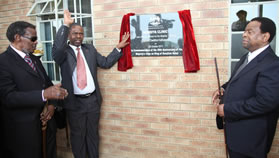 His Majesty King Goodwill Zwelithini accompanied by KwaZulu-Natal Health MEC Dr Sibongiseni Dhlomo recently opened Nomdiya Clinic in the Ulundi Municipality.
His Majesty King Goodwill Zwelithini accompanied by KwaZulu-Natal Health MEC Dr Sibongiseni Dhlomo recently opened Nomdiya Clinic in the Ulundi Municipality.
The clinic will play a major role in bringing much-needed healthcare closer to Zululand's rural communities.The opening coincided with the 40th anniversary of the reign of His Majesty as the King of the Zulu nation.
His Majesty, who addressed the community during the event, said the provincial Department of Health would ensure that quality healthcare was delivered in all rural areas.
Mayor of Zululand District Municipality Zanele Magwaza-Msibi and Dr Sibongile Zungu, who heads the provincial Department of Health, also attended the event.
SA sets out on the road to motoring safety
SA sets out on the road to motoring safety Estelle GreeffThe festive season is upon us, which means more cars on the roads and, tragically, more accidents.
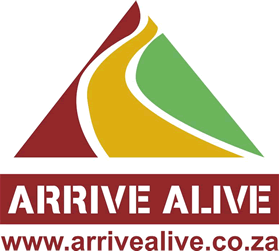 In South Africa, more than 1 000 people die on our roads every month. Many of these deaths can be prevented if all motorists obey the rules of the road.
In South Africa, more than 1 000 people die on our roads every month. Many of these deaths can be prevented if all motorists obey the rules of the road.
To promote road safety, the Road Traffic Management Corporation and the Department of Transport launched the Make Roads Safe Campaign as part of the International Decade of Action for Road Safety, with the slogan “Together we can save millions of lives”.
Road safety was made an international priority last year when the UN General Assembly proclaimed 2011 to 2020 the Decade of Action for Road Safety. The declaration was tabled by the Government of the Russian Federation and supported by more than 90 other countries, including South Africa.
Law enforcement
Transport Minister Sibusiso Ndebele said road safety campaigns would only succeed when road users changed their attitude towards the rules of the road. “The consciousness of people is increasing and people are becoming more aware of safety, but we still have a very long way to go in terms of the Decade of Action,” he said.
“…Education alone does not help, so we have introduced enforcement… We have 70 000 traffic officers throughout the country; if they just stop one or two vehicles per day we will meet and even exceed our set target of one million vehicles per month. But the presence of enforcement tells people that we are there, if you disobey the rules of the road there will be consequences.”
What you can do
In South Africa, the primary risk group for road accidents is men between the ages of 18 and 45. But no matter what age you are, if you drive a vehicle you must obey the rules of the road in the following ways:
- Never drive while under the influence of alcohol or other substances.
- Always wear a seat belt.
- Keep to the speed limit; speeding is a major cause of accidents.
- Be extra careful during weekends.
- Rush hour in the mornings and peak hour traffic in the afternoons are the most dangerous times on the road, so be extra careful during these times.
- Look out for pedestrians – pedestrian deaths make up almost 40 per cent of the deaths on our roads.
- Be extra careful in hazardous locations such as steep mountain passes, roadwork sites, potholes, animals on the road, wet roads, narrow roads and sharp bends in the road.
- Ensure that your vehicle is road worthy and that you have a valid driver’s licence.
For more information and tips on road safety, visit: www.arrivealive.co.za
Duty calls this festive season
Duty calls this festive season Estelle GreeffFor most of us the festive season is a time to relax and have fun, but for the police it's a time to be even more alert and ready for action. They have promised to make the holiday season a safe one for all South Africans and completely unbearable and dangerous for criminals.
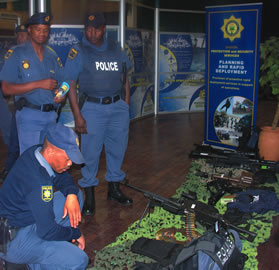 Pulling out all the stops to make sure the holidays are incident-free, the South African Police Service will rely on the Operation Duty Calls Festive Season Crime-Fighting Campaign.
Pulling out all the stops to make sure the holidays are incident-free, the South African Police Service will rely on the Operation Duty Calls Festive Season Crime-Fighting Campaign.
Police Minister Nathi Mthethwa, who launched the campaign in Gauteng recently, said they would build on last year's lessons and successes. "We will also increase high visibility patrols at all tourist destinations."
Police will pay special attention to intensifying operations in Cape Town, Port Elizabeth and Durban, which are popular holiday destinations.
There will also be a strong presence at shopping malls and other public places.
Shopping malls
Police operations will focus on crimes such as house and business robberies, cash-in-transit heists, ATM bombings, murder, rape and crimes against women and children.
Minister Mthethwa added that he wanted to read about failed robberies and criminals being arrested, instead of the increase in crime that is usually noted during the holidays.
"We will not just raise awareness about crimes at shopping malls and other public frequented areas during the festive season; our members will also be physically present to deal with any criminal."
Drug abuse
In addition, the police will pay close attention to drug abuse during the festive season. The drug trade and the problems it has created were causing headaches across the world, the Minister noted. “The police will fight the drug trade will all the power and the means to its disposal.”
Minister Mthethwa added that the police would make certain that criminals did not get any “undeserved bonuses” this festive season.
Communities
The Minister called on police to crush the plans of the criminals before they could even get off the ground and urged all South Africans to help fight crime since it affected everyone.
“We view communities as the cornerstone and important role-players in government’s goal of effectively dealing with crime,” he said.
Police operations aimed at delivering a crime-free festive season started in September and will continue until January.
To report crime, visit your nearest police station or call Crime Stop: 08600 10111.
Intelligence goes online to dispel secrecy
Intelligence goes online to dispel secrecy Estelle GreeffAre South Africa's Intelligence Services shrouded in mystery and something to be feared? Not at all, says Advocate Faith Doreen Radebe, Inspector General for Intelligence, who has been appointed by the President to independently oversee the activities of the Intelligence Services.
To dispel myths of secrecy and to strengthen civilian check on the work of South Africa’s Intelligence Services, the Office of the Inspector General for Intelligence has set up a website to reach out to the wider public.
The new website provides members of the public with information on how to lodge a complaint and provides full details of how a complaint is dealt with until completion.
South Africa’s Intelligence Services include the State Security Agency, also known as the National Intelligence Agency (NIA) and the South African Secret Service (SASS), the Intelligence Division of the Department of Defence and Military Veterans and the Intelligence Division of the South African Police Service.
Functions
The Inspector-General monitors and reviews the activities of the Intelligence Services and also investigates complaints received from the public and members of the Intelligence Services on alleged maladministration, abuse of power and transgressions of laws.
Abuse of power may include things like unlawfully tapping (listening in on private conversations) of a member of the public’s cellphone or landline or improper enrichment by a member of the Intelligence Services.
Mandate
The new website, in addition to facilities to lodge a complaint, also contains useful information on the mandate and functions of the Office of the Inspector General, as well as information relating to overseeing structures, both locally and internationally.
Speaking at the launch of the website, Adv Radebe said the website was a clear demonstration of her office’s commitment to providing a quality service and educating the wider public about the mandate of the Inspector-General and what was meant by “intelligence oversight”.
Adv Radebe added that the website was particularly important given the fact that to the wider public, intelligence services were often associated with secrecy and mystery and therefore seen as something to be feared.
Adv Radebe assured South Africans that through intelligence oversight their rights would be protected and that the Intelligence Services would operate within the values of the Constitution.
For more information, visit the website at: www.oigi.gov.za or call the toll free number: 0800 000 013.
New police watchdog body gets more bite
New police watchdog body gets more bite Estelle GreeffSouth Africa's new, strengthened police oversight body will be up and running at the start of 2012, replacing the current Independent Complaints Directorate (ICD).
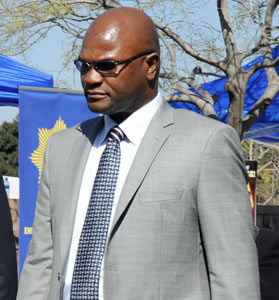 The Independent Police Investigative Directorate (IPID), which will replace the ICD, will have more investigative capacity and will report directly to the Police Ministry.
The Independent Police Investigative Directorate (IPID), which will replace the ICD, will have more investigative capacity and will report directly to the Police Ministry.
Police Minister Nathi Mthethwa said the IPID would have more powers than the present ICD as well as more investigators to probe alleged police misconduct. He added that there had been concerns that the ICD in its present set-up had been a toothless body when it came to probing misconduct.
The ICD did investigate matters and recommended action, but in many cases there had been lack of willingness to follow such recommendations.
"Now the new IPID will report directly to the civilian structure, namely the Ministry. The ICD worried itself with complaints and it became a complaints forum," the Minister said.
Presenting the ICD's annual report to Parliament recently, ICD Executive Director Francois Beukman said the new IPID would be ready to replace the current ICD as early as January 2012.
Bridging the maritime skills gap
Bridging the maritime skills gap Estelle GreeffThe ongoing issue of unemployment and skills shortage in South Africa, has prompted the maritime industry to launch a Maritime Skills Development Study. The maritime sector, which includes ports and ships, marine resources, marine tourism and leisure, marine manufacturing and construction and commercial support and business services, experiences a serious shortage of skilled people.
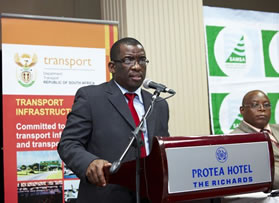 The study launched by the South African Maritime Safety Authority (SAMSA) is aimed at contributing to the process of skills development and empowerment in the maritime sector.
The study launched by the South African Maritime Safety Authority (SAMSA) is aimed at contributing to the process of skills development and empowerment in the maritime sector.
Undertaken in partnership with the Human Resource Development Council, the study was conducted with expert help from audit firm Deloitte of South Africa and support from the Department of Transport. It calls on training institutions, government and the private sector to work together to bridge the skills gap in the maritime sector.
Partnerships
"We value the partnerships forged with private international companies to assist with cadets deployment, but we also need to remind South Africans about the economic value that will be brought should we have our very own human capital to quantify for the employment opportunities on the business shore," SAMSA CEO Commmander Tsietsi Mokhele.
The study provides for measures that will be put in place to promote growth and development in the sub-sectors of the maritime industry: shipping; marine resources; marine tourism and leisure; marine manufacturing and construction; commercial support, business services and public interests.
Currently in South Africa, the ports and shipping sub-sectors are the biggest employers in the sector but this is to the exclusion of the other sectors that have been identified by the study.
Rebuilding devastated Duduza
Rebuilding devastated Duduza Estelle GreeffMore than a 1 000 young volunteers have lent a hand to rebuild houses damaged in a devastating tornado in Duduza, Ekurhuleni. The tornado, which struck in October, left more than 160 people injured and homeless and an eight-year-old child dead.
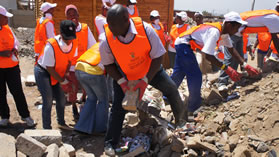 The volunteers, who are part of the National Youth Development Agency (NYDA), cooperated with the Ekurhuleni municipality and contractors under the supervision of contractors.
The volunteers, who are part of the National Youth Development Agency (NYDA), cooperated with the Ekurhuleni municipality and contractors under the supervision of contractors.
They removed rubble from building sites, steel from the building rubble, separated re-usable bricks from rubble; assisted with the distribution of food parcels, sorted relief supplies and helped with replanting trees around the community.
A helping hand
A group of approximately 300 of these volunteers completed the NYDA Accelerated Artisans and Skills Training Programme in March, which included training in electrical, plumbing, boiler making, welding, air conditioning and refrigeration skills. The remaining 700 volunteers are new recruits. The young volunteers will receive a monthly stipend, free transportation and meals for their help in rebuilding the community.
Volunteer Refilwe Nkosi, whose brother lives in the affected community, says she got involved because she saw how people were suffering in the community. They had lost their homes, belongings and everything they owned.
Refilwe asked her friends Nhlanhla Nkambule and Phumsile Radebe to come along and lend a helping hand as well.
"I am a little proud of myself and others for making progress in the area, I believe that God blesses the hand that gives more than the hand that receives and everyone can make a difference," she said.
Inspiration
According to NYDA CEO Steven Ngubeni, it is a selfless act for young people to assist those in need. "I take my hat off to you for taking time to assist these community members to rebuild their lives, you are an inspiration to other young people," he said.
The Ekurhuleni municipality has assessed that 692 houses were damaged, 174 of which need complete rebuilding and the remaining 518 to be repaired. It takes about two and a half days to build a house.
This initiative forms part of the National Youth Service Programme which is aimed at engaging young people in activities that develop and benefit their communities while acquiring meaningful and accredited skills that enable them to access economic opportunities for their sustainable livelihoods.
Please contribute
"We would like to encourage more South Africans, particularly young people, to contribute in any way they can. There is for instance a need for school uniforms, shoes, stationery, building materials, protective clothing for those that have offered to help with rebuilding, bottled water, paraffin stoves, disposable nappies and baby food," Ngubeni concluded.
You can play a part in helping by dropping off your donated items at your closest NYDA office.
For more information call the NYDA on 011 651 7175.
Make your degree work for you on the JOBS database
Make your degree work for you on the JOBS database Estelle GreeffThe National Youth Development Agency is calling all unemployed graduates between the ages of 18 and 35 to register on their JOBS database. If you are struggling to find a job; have done a learnership or a skills development programme and things aren't moving for you or if you are a matriculant, then JOBS can help you.
 JOBS, which is short for Job and Opportunities Seekers' Database, is a free online database and is part of the Unemployed Graduates Initiative, which was launched in December 2005.
JOBS, which is short for Job and Opportunities Seekers' Database, is a free online database and is part of the Unemployed Graduates Initiative, which was launched in December 2005.
Criteria
Graduates must meet the following criteria:
- unemployed South African citizens between the ages of 18 and 35 years
- graduated with a three-year qualification (national diploma or a university degree) in any field of study
- graduated with a postgraduate qualification (BTech, honours degree, masters degree or PhD) in any field of study.
People with disabilities
JOBS have received many requests from employers for people with disabilities. So, if you are a person with a disability and want to be considered for a job, you are also welcome to register on the JOBS database.
Submit your CV, proof of qualifications or academic records in one of the following ways:
Fax: 086 600 5883 or 086 600 1442
E-mail: graduates@nyda.gov.za
Post: P O Box 982, Halfway House 1685.
Hand delivered to: NYDA, 11 Broadwalk Avenue, Midrand.
For further information, call: Duduzile Mathonsi: 011 651 7130 or 651 7000 x1455 Tshepile Sehlodi: 011 651 7259 or 651 7000 x1430.
You can also visit your nearest NYDA Youth Advisory Centre to get assistance with registering.
Government goes green in KZN
Government goes green in KZN Estelle GreeffGovernment's first ever "green" building is likely to receive a five-star rating for adhering to strict environmental requirements.
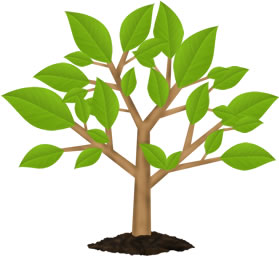 The KZN Public Works building is located on the outskirts of Ixopo and will house government offices on a 7,6 hectare site. It is also benefitting the local community by providing jobs and improving skills.
The KZN Public Works building is located on the outskirts of Ixopo and will house government offices on a 7,6 hectare site. It is also benefitting the local community by providing jobs and improving skills.
The building has reached the halfway stage in the construction process and when completed will ead the way in the green building design for future infrastructure projects.
Green star
The project is registered with the Green Building Council of South Africa who will assess the building before issuing a Green Star Design Rating. If this building receives the rating, it will be the first for any government building anywhere in South Africa.
MEC for Public Works and Human Settlement Maggie Govender visited the site recently and was pleased with the development.
Govender with a media delegation were given a tour of the building with architect Steven Kinsler explaining the low energy efficient building design.
Indigenous plants
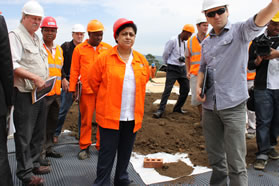 The building is expected to be completed next May and will boast a spectacular roof garden that will contain 70 indigenous plants.
The building is expected to be completed next May and will boast a spectacular roof garden that will contain 70 indigenous plants.
Govender explained that there is not much difference in terms of money spent on this building copared to traditional building methods. However, there will be “tremendous” savings later on.
Rainwater will be harvested and used for the garden and toilets, reducing the water consumption from the municipality.
Posters
There will be posters about how to make use of the building which will use alternative electricity. It will have renewable on-site energy generation through photovoltaics.
Photovoltaics, called PV for short, is a method of generating electrical power by converting solar radiation into direct current electricity using semi-conductors that exhibit the photovoltaic effect. Photovoltaic power generation employs solar panels composed of a number of solar cells containing photovoltaic material.
Due to the growing demand for renewable energy sources, the manufacturing of solar cells and photovoltaic arrays has advanced considerably in recent years. There will also be space heating using hydronic underfloor water heating system. Solar water heating will be the other method utilised to reduce regular electricity consumption.
Cement, wood and other building supplies used in the building had to contain a certain percentage of recycled material.
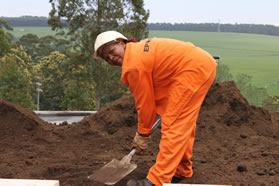 “Things like the bricks have been made locally. So local communities that benefited will want to showcase this building,” said Govender.
“Things like the bricks have been made locally. So local communities that benefited will want to showcase this building,” said Govender.
Local community
For the local community, this project has brought employment – 51 jobs have been created while 113 work opportunities were made available.
Vusi Ndlovu, 33, has been working on the site since January. He is in charge of the tool shed and building material. Every day he distributes tools to his colleagues and also checks that there is an adequate supply of building material.
Electricity on the site is provided through a generator. Ndlovu has been trained to monitor the generator and is happy to have learnt a new skill.
“I am learning a lot, like how to organise tools and about recycling some of the material. I also learnt how the generator works,” said Ndlovu.
The young man also takes the initiative to learn every day – once he completes his task, he watches and learns how to do different things.
He is interested in this building because of the environment-friendly elements that have been introduced during the construction process.
Pius Hadebe (30) who is also working for the EPWP, said he has learned a lot from the construction of the green building.
Hadebe works as a carpenter and is pleased that things were done differently for this building, as it offered him a chance to improve his carpentry skills.
Bicycle rack
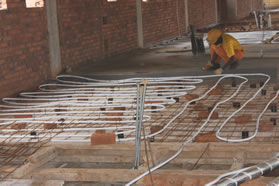 The site has received 10 positive audits that are conducted by the Environmental Control Officer who monitors environmental impact issues.
The site has received 10 positive audits that are conducted by the Environmental Control Officer who monitors environmental impact issues.
The building will have a bicycle rack and shower facilities to encourage employees to cycle to work. The design also caters for disabled people – there is wheel chair access throughout the building.
Govender said her department hopes to come up with a standard design that can eventually be used in government’s schools and hospitals.
There are plans for tours to the building during the upcoming COP17.
Cherry on top for interns
Cherry on top for interns Estelle GreeffDetermination and vigour paid off for a group of interns at the Mpumalanga Department of Agriculture, Rural Development and Land Administration (DARDLA). The cherry on top was when they recently received certificates in recognition of their hard work.
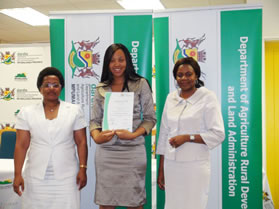 The interns who worked at the department for 2010/11 were selected from 1 000 applicants. The certificates will not only boost their confidence, but also their changes of getting permanent employment in future.
The interns who worked at the department for 2010/11 were selected from 1 000 applicants. The certificates will not only boost their confidence, but also their changes of getting permanent employment in future.
The internship programme is an intervention by government that deals with unemployment and skills shortages, especially among the youth. Young graduates are given opportunities to gain practical work experience thereby bridging the gap between work and study.
Hloni Thabethe from the DARDLA said, “The department is calling upon you to join us in creating a better life for the majority that constitute the workforce in the agricultural sector that has little access to primary healthcare, decent education and legal representation.”
She called on government departments to make the public sector attractive to young people and to transform the industry, as well as the rural landscape of the province. “We know that young people are still faced with challenges in making an impact in the sector hence enterprise development is ongoing. “
A record 73 per cent of the students who participated in the internship programme were able to find employment.
Kickstart your business with Y-AGE
Kickstart your business with Y-AGE Estelle GreeffAre you an enthusiastic entrepreneur with solid business ideas? Are you between the ages of 18 and 35 and lack funding to put your ideas into practice? Then the Y-AGE programme is meant for you.
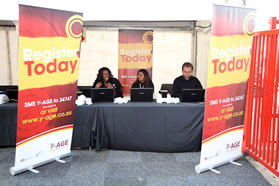 With high unemployment among the youth, young creative individuals should look no further than participating in the recently launched Y-AGE programme aimed at entrepreneurs aged between 18 and 35 who lack funding for their businesses.
With high unemployment among the youth, young creative individuals should look no further than participating in the recently launched Y-AGE programme aimed at entrepreneurs aged between 18 and 35 who lack funding for their businesses.
Y-AGE, which is short for Youth and Graduate Entrepreneurship Development Programme, has been described as a turning point in the fight against unemployment.
One of the aims is to empower South Africa’s youth to kickstart their businesses, which in turn will to more jobs. The programme which was launched by the Department of Economic Development together with the Gauteng Propeller, will not only benefit unemployed youths. It will also assist individuals with existing businesses in need of funding, as well as those whose businesses have collapsed due to a lack of funds. As part of the deal, they will receive training and mentoring to assist them in starting their own business.
Opportunity of a lifetime
Opportunity of a lifetime Y-AGE is currently targeting 100 000 young South African entrepreneurs with creative ideas and skills to start up their own businesses which will lead to the creation of about one million jobs. It will also see more business opportunities arising, stimulating a variety of job opportunities and encouraging more people to take part in the economy.
“This is an opportunity of a lifetime. If you snooze you lose. Do not blame government tomorrow that it did not do anything for you,” said MEC Qedani Mahlangu.
“This is an opportunity of a lifetime. If you snooze you lose. Do not blame government tomorrow that it did not do anything for you,” said MEC Qedani Mahlangu.
Y-AGE fact sheet
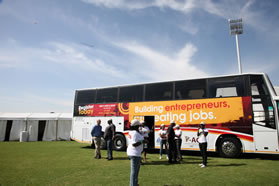 Y-AGE is a public-private partnership created to respond practically to the need for job creation through entrepreneurship.
Y-AGE is a public-private partnership created to respond practically to the need for job creation through entrepreneurship.- It is an entrepreneurship development initiative founded by three partner organisations – SACORD, Hope Africa and Oresego Holdings.
- It aims to create 100 000 youth and women entrepreneurs by the end of 2012.
- It aims to create 1 million new jobs through new entrepreneurial ventures.
- It is a collaborative venture involving various civil society entities, together with the private sector, to help support the creation of these new jobs.
- Y-AGE has the endorsement of the MEC for Economic Development in Gauteng.
- The Y-AGE programme was piloted in Ekurhuleni where 10 000 young people were trained to run their own businesses.
- The main focus of Y-AGE is to encourage public and private sector partnerships to share resources to expand entrepreneurship in South Africa and to create new jobs.
- Funding for the Y-AGE programme comes from the Gauteng Economic Development Department, Services SETA, Private Commercial Funders and Private Service Providers.
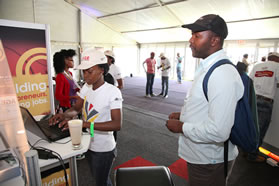 R30 million has been allocated this year to stimulate the Y-AGE programme within the MTEF and to contribute towards the national target of five million jobs.
R30 million has been allocated this year to stimulate the Y-AGE programme within the MTEF and to contribute towards the national target of five million jobs.- A working partnership has been formed with the Gauteng Enterprise Propeller as part of the contribution by the Department of Economic Development in Gauteng, to implement the programme.
- Y-AGE is founded on a business model supported by research undertaken by the University of Johannesburg.
- The Y-AGE programme is based on seven key pillars – research, recruitment, selection, training, funding, monitoring and evaluation, and mentorship and support.
- 50 per cent of candidates selected for the Y-AGE programme will be women and youth business owners, aged between 18 and 35 (graduates up to age 40).
- There is rigorous screening process for successful Y-AGE programme entrepreneurs.
- Training in ‘New Venture Creation’ will be given to each candidate entrepreneur to NQF Level 4 through approved, qualified service providers.
- A monitoring and evaluation programme will identify progress with each entrepreneurial venture, providing assistance to ensure ventures perform to targets.
- Industry specialist mentors are appointed to each entrepreneurial venture.
- A governance structure has been created to ensure the appropriate management and operation of the programme.
Who qualifies?
To qualify for the programme, you need to meet the following requirements:
Selection process
- You must be between 18 and 35 years old and have a firm business idea. You will also be considered if you have an existing businesses, but lack funding to
keep it going. - Commitment fee and registration:
Interested youths have to pay a commitment fee of R500 to be considered. They will then receive a learner contract, a Y-AGE banking account and a materials packs with programme schedules.
Training
Training is divided into two categories to
accommodate individuals according to
their skills development needs as follows:
- Individuals who have no business
experience. - Individuals who do have business
experience.
Business plan evaluation
and funding
Individual business plans will be assessed before funding is provided with 20 per cent of the fund made up of a grant provided by the Development Funding Institution and an 80 per cent loan from the Financial Lending Institution.
Starting the business
Interested individuals with creative entrepreneurial ideas who lack funds are encouraged to register on the Y-AGE database, which will be available in large companies as well as various government departments.
South Africa – the global player
South Africa – the global player Estelle GreeffInternational relations
Map of the world indicating the countries with which South Africa has had negotiations regarding some key foreign-policy issues. South Africa's foreign policy entails promoting economic diplomacy, which will attract invest-ment and tourism, remove barriers to trade, support the development of larger markets in Africa and expand the markets for South African products.
Since 1994, the international community has looked on South Africa as a champion of human rights, democracy and reconciliation. The country has since managed to remain committed to its advocacy of democracy and, over the years, has played a meaningful role in the region, on the continent and internationally.
The year 2011 saw South Africa join two major international organisations; as a non-permanent member of the United Nations Security Council (UNSC) and as a member of the rising heavyweight club of Brazil, Russia, India and China – which together with South Africa form BRICS.
Through the country's involvement in international affairs, South Africa has had to establish a firm foreign policy approach. This was especially necessary in dealing with issues such as the building of Africa's newest state, South Sudan; helping famine-hit Somalia and assisting in the demand for real democratic reform in northern Africa and the Middle East.
South Africa believes in a democratic and open society, in which government is based on the will of the people and every citizen is equally protected by law.
Rapidly changing world
Some commentators have labelled South Africa’s foreign policy “spineless” forgetting that the foreign environment is a complex one, even more so for a young, developing country, which is facing the challenge of balancing its national interests against international realities in a rapidly changing world.
President Jacob Zuma recently clarified the country’s foreign policy, explaining South Africa’s position on various international issues.
South Africa believes in a democratic and open society, in which government is based on the will of the people and every citizen is equally protected by law, in addition to democratic values, social justice and fundamental human rights.
According to the President, the country’s foreign policy is based on four pillars:
- promoting the interests of the Southern African Development Community (SADC) and Africa
- promoting global equity and social justice
- recognising the significance of the developed North in forging ahead, while improving South-South cooperation
- strengthening and transforming the multilateral system.
South Africa’s foreign policy entails promoting economic diplomacy, which will attract investment and tourism, remove barriers to trade, support the development of larger markets in Africa and expand the markets for South African products.
This is linked to government’s commitment to eradicating inequality, unemployment and poverty.
So far, the results are encouraging. South Africa’s global exports have become more diverse over the last few years, increasing from R477 billion in 2007 to R584 billion in 2010.
Let’s look at South Africa’s foreign-policy position on a few key issues:
1 Palestine and Israel
South Africa supports the view that negotiations must be resumed to reach a lasting settlement to the Israeli-Palestinian conflict. This solution should fulfil the aspirations of both parties for independent homelands through two states for two peoples, namely the State of Israel and an independent, adjoining and viable State of Palestine, living in peace and security. This is according to international agreements and relevant United Nations (UN) resolutions.
The peace agreement should also guarantee the security of both states, and address the rights of the return of Palestinian refugees, as well as the status of Jerusalem.
2 Syria
This country is integral to a wider resolution to the Middle East conflict. Its stability is linked to that of its neighbours as any action by the international community on Syria, including action by the United Nations Security Council should take the regional implications into consideration.
To emphasise this, South Africa abstained from the vote in the UNSC draft resolution on Syria, which strongly condemned Syrian authorities for their violent crackdown against pro-democracy protesters.
South Africa has urged Syria, including the opposition, to initiate transparent and all-inclusive political processes with its people to address their fundamental political rights and freedoms.
3 China
Relations with China have been elevated from a “strategic partnership” to a “comprehensive strategic partnership ”which is the beginning of a new relationship between the two countries.
Government believes that this Asian giant, as China is often called, will play a meaningful role in contributing to the country’s domestic priorities.
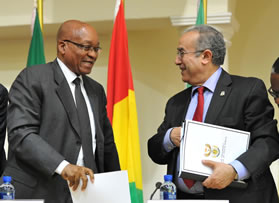 South Africa also supports Beijing’s One-China Policy, which rejects Tibet’s independence. It maintains that the One-China Policy is consistent with international law, which recognises the People’s Republic of China as the sole and legitimate representative of all the people of China.
South Africa also supports Beijing’s One-China Policy, which rejects Tibet’s independence. It maintains that the One-China Policy is consistent with international law, which recognises the People’s Republic of China as the sole and legitimate representative of all the people of China.
4 Libya
Following the death of Libyan leader, Muammar Gaddafi, South Africa has called for peace and reconciliation in that country.
A lasting and sustainable peaceful solution is possible through an all-inclusive political process. This will lead to the first-ever democratic elections in accordance with the Roadmap as announced by the National Transitional Council (NTC) of Libya.
Government is committed to work together with the African Union (AU), the UN, the League of Arab States and the Organisation of Islamic Conference to ensure coordinated support to the NTC and the Libyan people in general in their efforts to reconstruct their country and to bring about democratic, political and socio-economic changes.
Peace, stability and security are essential preconditions for development in Africa.
5 United Nations
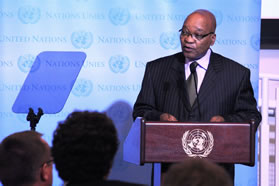 South Africa and like-minded countries such as India and Brazil feel that the developing world, especially Africa, has a limited voice and participation in the decision- and policy-making processes of the global trade, economic and financial institutions.
South Africa and like-minded countries such as India and Brazil feel that the developing world, especially Africa, has a limited voice and participation in the decision- and policy-making processes of the global trade, economic and financial institutions.
This, it maintains, weakens the world’s response to the developmental agenda of Africa and the South. Government says it will use its non-permanent member seat at the UNSC to advance Africa’s interests.
6 African Union
Government has pledged to intensify its engagements and structures in the AU in order for the AU to fulfil its role in building African unity and the social and economic development of the continent.
Further, it will continue to support regional and continental processes to respond to and resolve crises, strengthen regional integration, significantly increase intra-African trade, and champion sustainable development and opportunities in Africa.
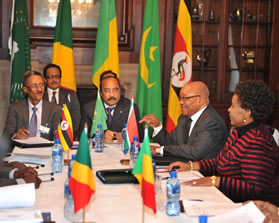 Peace, stability and security are essential preconditions for development in Africa. South Africa will work with the AU to discourage unconstitutional changes in governments.
Peace, stability and security are essential preconditions for development in Africa. South Africa will work with the AU to discourage unconstitutional changes in governments.
It will also continue to support AU and UN initiatives to find just and lasting solutions to outstanding issues of self-determination and decolonisation on the African continent.
7 Southern African Development Community
The integration of the SADC remains critical for the economic development of the region and for South Africa’s global competitiveness. Integration will offer an opportunity for regional industries to overcome the limits of small national markets, achieve economies of scale and enhance competitiveness.
South Africa also maintains that the region must be allowed to determine its own regional integration agenda and pace, without external interference.
The strengthening of the SADC is an essential requirement to ensure the economic viability of the region, as well as strengthening of regional economic programmes. These include the integration of the SADC, the Common Market for East and Southern Africa, the East African Community and the Southern African Customs Union, which will be an anchor in the SADC Free-Trade Area.
8 Zimbabwe, Madagascar and the Democratic Republic of Congo
As chair of the SADC troika, South Africa will do everything in its power to en-sure lasting peace and stability in these countries.
On Zimbabwe, South Africa has vowed to continue to call on the parties to create a conducive environment for credible, peaceful elections in accordance with the Global Political Agreement.
On Madagascar, South Africa says there is no alternative to the mediation effort and the Roadmap recently signed by the parties. It hopes to see democratic elections by the end of 2012.
9 Sudan and South Sudan
In line with the AU’s Post-Conflict Reconstruction and Development process, Africa will continue to support efforts aimed at ensuring peace and stability in South Sudan and its neighbourhood.
It will also assist in creating conditions for firmly establishing democracy and the development of government institutions in South Sudan. However, it has called on both sides to settle all the outstanding issues between them according to a specific time frame.
10 Somalia
Government supports a comprehensive approach that addresses both the economic and political challenges in Somalia, including the need to resolve the security and humanitarian situation in the country.
South Africa’s view is that counter-violence, aggression and acts of terror are counter-productive and will not deliver peace and security to the Horn of Africa.
11 European Union (EU)
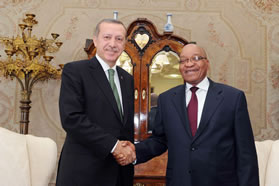 Notwithstanding Europe’s economic challenges, South Africa aims to continue to encourage its European partners to engage in the development of the African continent, meet their development assistance commitments, and push for the reform of the Common Agricultural Policy due to its detrimental effects on development in Africa.
Notwithstanding Europe’s economic challenges, South Africa aims to continue to encourage its European partners to engage in the development of the African continent, meet their development assistance commitments, and push for the reform of the Common Agricultural Policy due to its detrimental effects on development in Africa.
South Africa aims to work with the EU to open up market opportunities and attract increased foreign direct investment. It also aims to continue to cooperate and engage with European countries beyond the EU, such as Russia and Turkey, recognising their important role in regional support such as the AU’s peace and security initiatives and global politics in general.
12 Americas and the Caribbean
Bilateral relations with the countries of the Americas and the Caribbean serve as a firm foundation for advancing multilateral cooperation and promoting South Africa’s domestic priorities.
The United States of America (USA) continues to be an important trading and development partner of South Africa and Africa. The USA continues to influence global events and it is for this reason that South Africa engages the USA at various levels.
It will also expand bilateral relations with Latin America, Canada and the Caribbean, and continue to strengthen cooperation within the context of groupings of the South. In addition, South Africa will continue to develop relations with Cuba and to lobby for the lifting of the economic embargo.
Working for common values and goals
Working for common values and goals Estelle GreeffInternational relations
International peace and security, democracy, good governance, sustainable development, debt management, education and the environment were among the issues discussed at the Commonwealth Heads of State and Government Meeting (CHOGM), held in October in Perth, Australia.
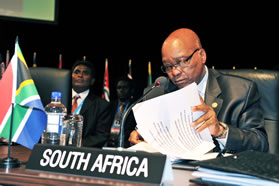 Every two years, Commonwealth leaders meet at a different location to discuss global and Commonwealth issues including collective policies and initiatives.
Every two years, Commonwealth leaders meet at a different location to discuss global and Commonwealth issues including collective policies and initiatives.
President Jacob Zuma, who represented South Africa at the meeting, said the discussions at this year’s meeting were in line with South Africa’s Constitution and the country’s foreign policy objectives.
Equal status
The Commonwealth of Nations, normally referred to only as the Commonwealth and formerly known as the British Commonwealth, is an intergovernmental organisation of 54 independent member states. All of these countries except Mozambique and Rwanda, were formerly part of the British Empire from which it developed.
The member states cooperate within a framework of common values and goals as outlined in the Singapore Declaration. The Commonwealth is not a political union but an intergovernmental organisation through which countries with diverse social, political, and economic backgrounds are regarded as equal in status.
Issues discussed at the recent summit related to trade and investment opportunities, strengthening people-to-people relations and promoting shared values. With the Theme “Building National Resilience, Building Global Resilience” the meeting focused on food security, climate change, mining for development, wiping out polio, sustainable development and strengthening the Commonwealth. This included promoting Commonwealth values such as democracy, the rule of law and human rights.
Benefits
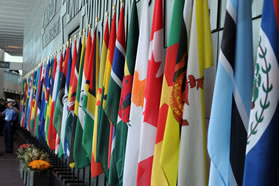 South Africa became a member of the Commonwealth in 1931, but was expelled in 1961 as a result of the previous government’s apartheid policies.
South Africa became a member of the Commonwealth in 1931, but was expelled in 1961 as a result of the previous government’s apartheid policies.
During the anti-apartheid struggle, the Commonwealth played an important role in lobbying for the end of racism and contributed to the mounting international pressure placed on the apartheid government.
This legacy of support was an important factor in South Africa’s decision to rejoin the Commonwealth following the election of the first democratic Government in 1994.
South Africa’s current membership of the Commonwealth has various benefits such as contributing to advancing South Africa’s national interests and providing a platform to create a “better Africa and better world” through the promotion of democracy, human rights, free trade and world peace.
Plenty to discuss for G20
Plenty to discuss for G20 Estelle GreeffInternational relations
The Group of Twenty (G20) was established in 1999, in the wake of the 1997 Asian financial crisis, to bring together major developed and developing economies to stabilise the global financial market. Since its inception, the G20 has held annual meetings of finance ministers and central bank governors to discuss measures to promote international financial stability and to achieve sustainable economic growth and development.
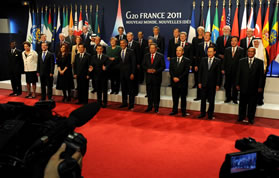 Issues such as infrastructure development in Sub-Saharan Africa and global food security were included in discussions at this year's G20 summit held in France recently.
Issues such as infrastructure development in Sub-Saharan Africa and global food security were included in discussions at this year's G20 summit held in France recently.
President Jacob Zuma, accompanied by Finance Minister Pravin Gordan, joined delegates from other G20 member countries in Cannes from 14 to 15 October.
South Africa's focus was centred on issues such as investment in infrastructure, food security, domestic resources and global partnerships for financial access.
"We are encouraged by the commitment to deal with the current economic crisis, as well as undertakings to reduce imbalances in the world economy to promote sustainable, poverty-reducing and employment-creating growth,'' said President Zuma on his return from France.
The summit also made a commitment to focus on the youth largely affected by the global financial crisis, which is in line with South Africa's own domestic focus on promoting inclusive growth and decent jobs.
"There's a recognition that lack of jobs for young people brings social challenges and a decline in social cohesion," said Minister Pravin Gordan.
Mexico will be the next leader of the G20 and during its year-long run employment, as well as the needs of poorer countries will be one of the key focus points.
IBSA – connecting three continents
IBSA – connecting three continents Estelle GreeffInternational relations
IBSA was formed in 2003 by the Brasilia Declaration, with the purpose of bringing together India, Brazil and South Africa to strengthen their position as developing nations and to enable them to act as part of the global arena. In addition, their status as middle powers, their need to address social inequalities and their consolidated industrial areas were also important reasons for closer collaboration.
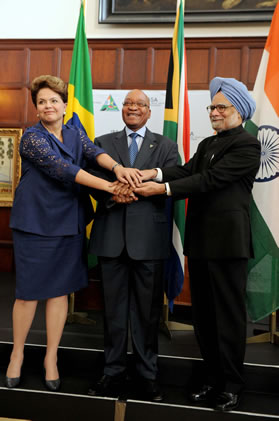 These countries are determined to make their voice heard internationally around common issues strengthen ties among themselves. In doing so, they aim to help restructure the global political, economic and financial issues and make these issues fairer, more balanced and based on an equal voice for all involved. The IBSA also aims to work together with less developed countries.
These countries are determined to make their voice heard internationally around common issues strengthen ties among themselves. In doing so, they aim to help restructure the global political, economic and financial issues and make these issues fairer, more balanced and based on an equal voice for all involved. The IBSA also aims to work together with less developed countries.
Common views
Three common traits characterise the IBSA countries: all three countries are vibrant democracies, share common views on various global issues and are emerging economies.
South Africa is a member of a number of countries with similar strategic political and socio-economic outlooks. All IBSA countries serve on the UN Security Council as non-permanent members. This makes it easier to work together with issues of common interest among the three countries.
The combined population of the three IBSA countries were 1.384 billion in 2008 with a combined average growth of 5.4%. Apart from promoting dialogue in the southern hemisphere, IBSA also promotes inter-regional cooperation.
The IBSA countries work together on three levels: heads of state and government, government-to-government and people-to-people cooperation.
Trade
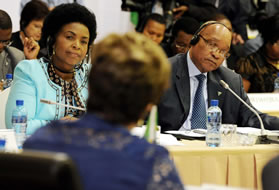 South Africa’s trade with its IBSA partners has increased significantly since the forum’s inception. The country’s trade statistics for period 2007 to 2010 with fellow IBSA countries show an increase from R36,92 billion in 2007 to R58,13 billion in 2010.
South Africa’s trade with its IBSA partners has increased significantly since the forum’s inception. The country’s trade statistics for period 2007 to 2010 with fellow IBSA countries show an increase from R36,92 billion in 2007 to R58,13 billion in 2010.
IBSA has an open and flexible structure. It does not have headquarters or a permanent executive secretariat. At the highest level, it meets summits of heads of state and government.
The most recent summit took place from 18 to 19 October 2011, in Pretoria, which led to the agreement of the IBSA Dialogue Forum Fifth Summit of Heads of State and Government, Tshwane Declaration.
The IBSA countries work together on three levels: heads of state and government, government-to-government and people-to-people cooperation.
Objectives
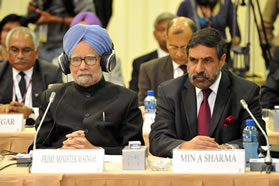 The objectives of this summit were to promote:
The objectives of this summit were to promote:
- south-south dialogue, cooperation and common positions on global political and multilateral issues of importance
- trade and investment opportunities between the three countries, as well as the exchange of information, expertise, technologies and skills
- social development through poverty alleviation
- cooperation in a broad range of areas, such as agriculture, climate change/environment, culture, defence, education, energy, health, human settlement, information society, public administration, revenue administration, science and technology, social development, trade and investment, tourism, and transport, and people-to-people cooperation.
Aims
The aims of the fifth IBSA summit were:
- to reinforce the features of IBSA and its distinct role in the global arena
- to promote coordination within multilateral forums
- to leverage opportunities for South Africa’s development agenda, notably infrastructure development
- to promote the African agenda through strengthened economic co-operation.
Discussions
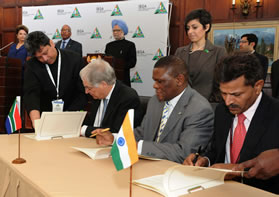 Issues discussed during the 5th IBSA summit, which are included in the Tshwane Declaration, were:
Issues discussed during the 5th IBSA summit, which are included in the Tshwane Declaration, were:
- coordination in multilateral institutions such as the UN Security Council, BASIC, BRICS, G20 and the G77 as well as China to bring about change of global governance
- sustainable development and climate change (COP17/CPM7, Rio+20, COP11 of CBD and COP/MOP6 of Cartegena Protocol on Biosafety)
- strengthened economic cooperation
- fulfilling the Millennium Development Goals
- promoting and protecting human rights and the empowerment of women, children, youth and persons with disabilities
- strengthening the African Union
- addressing the situation in the Middle East and North Africa
- supporting the IBSA facility for poverty and hunger alleviation through the IBSA Trust Fund.
Voice of Africa
As the IBSA Dialogue Forum approaches its 10th birthday and prepares to take on new challenges, the heads of state and government instructed ministers to review the work of the IBSA sectoral cooperation mechanisms and the IBSA facility for poverty and hunger alleviation. India has offered to host the 6th IBSA Summit in 2013.
South Africa will continue to promote participation in trilateral structures such as IBSA and multilateral cooperation in institutions such as the G20 and UN to make the voice of Africa heard on issues such as peace, security and development.
Hotline to the rescue with mobile care
Hotline to the rescue with mobile care Estelle GreeffPresidential Hotline
The Presidential Hotline is still going strong as it continues to help South Africans from all walks of life to resolve problems they experience when dealing with different levels of government.
Ambulance
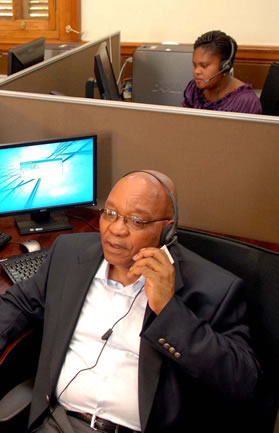 Among the residents whose complaints have been resolved is Paul Moutlwatsi of North West. Moutlwatsi had been complaining to the North West Health and Social Development Department about the lack of ambulance services in his area. He said one morning he called the ambulance to attend to a sick person and it did not arrive.
Among the residents whose complaints have been resolved is Paul Moutlwatsi of North West. Moutlwatsi had been complaining to the North West Health and Social Development Department about the lack of ambulance services in his area. He said one morning he called the ambulance to attend to a sick person and it did not arrive.
Moutlwatsi was desperate as he had no other form of transport to help the patient. He contacted the Hotline whose staff approached the North West Health and Social Development Department. They decided to establish a mobile primary healthcare service to the areas where there were no clinics including Moutlwatsi’s area.
Basic services
In KwaZulu-Natal, a local resident Bonginkosi Ngubane from KwaNgwanase near Manguzi near the border with Mozambique approached the presidential hotline complaining about the absence of basic services in his village of Velabusha.
Among the services that Ngubane complained about were the lack of tarred roads, electricity, sanitation, health facilities and houses. He also complained that local villagers could not use their cellular telephones as there was no network coverage.
Despite several meetings with the local mayor and councillors, nothing had been done. Hotline staff informed the relevant government departments and the local municipality. Thanks to intervention by hotline staff, water and sanitation services has been put into place and the cellular network has improved.
Ngubane called the hotline to let them know that conditions had improved, especially after the municipal elections in May. He said the newly-elected council was regularly having meetings with the villagers to listen to the community’s complaiants and find solutions to challenges.
For more information, call the Presidential Hotline 17737. Never abuse the hotline; use it responsibly.
Listening to Limpopo's people
Listening to Limpopo's people Estelle GreeffPresidential Hotline
Launched in April this year, the Limpopo Premier’s Hotline has gone from strength to strength.
Among the complaints successfully resolved in recent weeks is the case of a disabled man who was denied access to water. A complaint was lodged by Mavis Baloyi on behalf of the disabled man from Mokopane.
Access to water
He complained about people in his region denying him the right to use water simply because he did not contribute to the tap that was installed.
The Mogalakwena Municipality through the ward councillor approached the community, as well as the Traditional Authority about this issue. All parties stated their cases and through negotiations, the complaint was resolved. The disabled man is now getting his constitutional right of access to basic services such as water.
Unused land
In Modderspruit, Mosiwa Kokwana complained about empty, undeveloped land, while many people didn’t even have houses. He said he had called on the local municipality to buy the land to build houses and schools for their children, because they walked long distances to get to school.
According to the councillor, Mr Pietros Makgabo the land in question was privately owned and too expensive to be bought by the municipality. Engagements with SAMANCO, a mining company are currently underway about entering into a bid to purchase the land. The development of houses and schools will also be considered in future.
For more information, call Limpopo Premier ‘s Hotline: 0800 864 729.
Letters to the Editor - Give us a piece of your mind
Letters to the Editor - Give us a piece of your mind Estelle GreeffWinning letter - Teach your children while they are still young
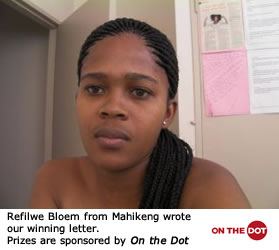 Life has taught me that it is best to teach your children about life while they are still young. Let’s teach our kids to start saving money from an early age, even if it is just R1.00 a day. This will help them control their use of money even when they are old. Let’s teach our kids to read, because the more they read the more knowledge they gain, it can be a newspaper or a magazine. Let’s teach our children the importance of watching and listening to the news. Most important let us teach our children the importance of communication, let us help our children with home works, and stop complaining that the educators are not doing their work, after all it is your work too.
Life has taught me that it is best to teach your children about life while they are still young. Let’s teach our kids to start saving money from an early age, even if it is just R1.00 a day. This will help them control their use of money even when they are old. Let’s teach our kids to read, because the more they read the more knowledge they gain, it can be a newspaper or a magazine. Let’s teach our children the importance of watching and listening to the news. Most important let us teach our children the importance of communication, let us help our children with home works, and stop complaining that the educators are not doing their work, after all it is your work too.
– Refilwe Bloem, Mahikeng, North West
We would like to hear from you
If any of the information published in Vuk'uzenzele has helped you in any way to improve your life, we would love to hear from you. Don't forget to include your telephone or cellphone number and address.
Teach the youth to fish
It is better to teach a man to fish than giving him a fish for the day. So I would like government to open doors for those who did not manage to finish their matric studies to get learnerships. I'm not saying government should just give jobs to the youth – government has already done a lot for the us. We must therefore not be lazy and complain that government is useless; we should rather stand up and strive for survival by going out and doing things for ourselves.
Have you thought what profitable things you can do with the time wasted by sitting at home, waiting for fate to come and save you from yourself. Let's work hand-in-hand with our government and try to overcome poverty, crime and unemployment in this country.
– Thembisa Ngaka, Sedgefield, Western Cape
You are the best ever
I’m a vibrant young person and I would like to thank Vuk’uzenzele for making a huge important contribution towards youth. I went to the bursary website it recommended for me and I got what I wanted. Now I have a bursary from the law firm and some scholarship for next year for studying LLB at Fort Hare University. I must consider on going for a bursary or scholarship thanks to the great newspaper ever. I encourage the young people to not give up in life no matter how hard. Government has introduced something we always wanted. Thanks to the NYDA for creating learnerships for young people.
– Kagiso Rabyang, Tlhabane, North West
Let's cure TB
South Africa was able to manage diseases like Polio by giving its citizens proper medication. TB can also be cured if infected individual make it their responsibility to take medication. Keep in mind that All South Africans are affected by this pandemic and everyone is also vulnerable to it, so there is no more time to worry about the stigma, worry about your health being. Local Clinics do offer "rouforfour" (TB medication), take a stand and be healed.
– Kagiso Monama, Hammanskraal, Gauteng
Fed-up to my knees
I’m fed-up to my knees with age limit. When you apply for a job, even if you have the necessary requirements, you don’t qualify because of your age (I am 55 years old). When you apply for a grant, you are told that you are young. How old are we supposed to be? Age limit is a severe punishment to those who are older than 35 years.
– Julia Gcobokazi, Sterkstroom, Eastern Cape
You have motivated us
Vuk’uzenzele has motivated the Lonwabo community services primary co-oporative in a way that we have registered our own co-operative in a period of four months. We have reached different business service providers, SEDA, Reddoor and other organisations. We have registered, applied for funds, joined organisations. Presently, we are about to start a business initiative to start a small Internet café and we are looking forward to embarking on other developing projects. These endeavours have been inspired by Vuk’uzenzele magazine – now a newspaper.
– Lawrance Keith, Paarl, Eastern Cape
Vuk'uzenzele, Private Bag X745, Pretoria, 0001, or e-mail: vukuzenzele@gcis.gov.za. If you don’t want your real name published you may use a different name, but please include your real name and address. Please note: To win a prize you must include a physical address and a contact telephone number. Prizes that re not claimed within 90 days of publication, will be forfeited.
SA schools go green to save tomorrow today
SA schools go green to save tomorrow today Estelle GreeffYouth matters
Eco-Schools programme is implemented by the Wildlife and Environment Society of South Africa (WESSA) and forms part of the international Foundation for Environmental Education (FEE), which looks at how children can be roped into helping to save the environment.
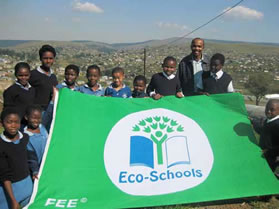 The WESSA/WWF Eco-Schools programme helps schools to use the environment as a learning tool through the national curriculum.
The WESSA/WWF Eco-Schools programme helps schools to use the environment as a learning tool through the national curriculum.
The programme's innovative "change framework" also aims to teach a new generation of consumers and leaders how to be part of the solution to the environmental challenges.
Seven steps
National Coordinator for Eco-Schools Bridget Ringdahl says that at least 1 300 schools have volunteered to be part of the programme nationwide.
“It’s a simple, but effective concept, which has seen the programme grow consistently since its introduction to South Africa in 2003.”
There is a seven-step process towards sustainable development within their institutions and in local communities.
In line with the national curriculum, the programme was adapted for South Africa at the Environmental Education and Sustainability Unit at Rhodes University as part of a peer-reviewed research process.
Passionate teacher
Rustic Manor Primary north of Durban has been a part of the Eco-School programme for almost seven years.
The school was fortunate to have an educator, Kritisha Rajcoomar, who is passionate about the environment and has an honours degree in the field.
Rajcoomar identified the need to cultivate environmental awareness among the learners and the staff soon got on board with her plan.
“When we started all we had was just one small food garden, but now we even have parents who choose to get involved by taking part in clean-up programmes,” says Rajcoomar.
The school did a few audits to assess water and energy usage. They identified their shortcomings and devised an action plan which is still in operation.
Environmental learning
The South African Department of Education has adapted a strategy to include environmentally themed curriculums. When schools register with the programme, they commit to improving environmental learning and action through the curriculum.
Relevant themes are chosen by the learners and teachers, lesson plans are developed and school improvement plans and records of their progress are collected in a portfolio.
Some notable achievements at Rustic Manor include a food garden, which uses only elements of nature to grow vegetables and fruits.
Rajcoomar also got learners and teachers to recycle she has been collaborating with Durban Solid Waste to ensure that plastics and paper are recycled.
Waste material
In addition, the resourceful educator has helped her students participate in environmental market-day competitions where the learners showcase their goods made from waste material.
“We teach them that money can be made from waste and these competitions also allow us to network with other schools,” she says. “The learners are greedy for knowledge. It’s therefore important to know how to get the information across.”
Rajcoomar explains that picking up litter is seen as punishment for children who misbehave, but if you motivate them, they will understand how a cleaner environment would benefit them.
“Don’t put out negative messages about the environment, rather tell them if the gardens in the schools are kept clean, they could have lessons outdoors,” she says.
For more information contact the National Eco-Schools coordination team: Tel: 033 330 3931 or e-mail ecoschools@wessa.co.za
Pioneering youth
Pioneering youth Estelle GreeffYouth matters
The South African Qualification Authority (SAQA) has finally accredited the Department of Social Development’s youth training and education programme. Masupa-Tsela Youth Pioneer Programme is now an official further education and training qualification.
“We are very happy and encouraged that Masupa-Tsela Youth Pioneer programme is finally accredited, especially after it was stopped for the whole of this year due to non-accreditation. It is now a fully fledged nationally recognised further education certificate course,” said the Masupa-Tsela National Project Manager Mr Ephraim Kgosana.
Mr Kgosana indicated that the accreditation of the training programme would assist the Department and the ETDP Seta to confer proper further education and training certificates to last year’s intake of about 2 000 learners. These learners received only attendance certificates at completion of the course last year.
Community Development
The programme is accredited on NQF Level 4 as a Further Education and Training Certificate in Community Development. On completion, the certificate will allow learners to work as Community Development Practitioners and Early Childhood Development Practitioners.
However, learners will require level five and six to gain admission to study social sciences or community development related qualifications at the Technikons and Universities, respectively. Learners will receive a scholarship and a R1 500 monthly stipend for the duration of their training and service.
Patriotism
Recruitment for the next group will be conducted next year between January and February, according to Mr Kgosana. “The course will resume next year and it will be offered for a period of one year and six months,” he explained, adding that the department aims to train 14 150 youth by the end of 2015.
The Masupa-Tsela Youth Pioneer Programme is a multi-sectoral initiative based on the Cuban Social Work and Jose Marti Pioneer Programmes. The programme seeks to instil a sense of patriotism in learners and train youth to be social activists of change.
Off to study scarce skills in Serbia
Off to study scarce skills in Serbia Estelle GreeffYouth matters
Nineteen-year old Brenny Maruma could not hide her happiness. Reason being, she is one of the 10 young South Africans who have received scholarships to study for a scarce-skills qualifications at the University of Belgrade in Serbia.
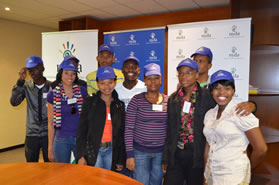 Located in the centre of the Balkan Peninsula, in south-eastern Europe, the country boasts beautiful mountains, national parks, rivers and lakes. The international roads and railway lines, which run through the country, form the shortest link between Western Europe and the Middle East.
Located in the centre of the Balkan Peninsula, in south-eastern Europe, the country boasts beautiful mountains, national parks, rivers and lakes. The international roads and railway lines, which run through the country, form the shortest link between Western Europe and the Middle East.
Maruma and nine other youths had in mid-October jetted off to Serbia to begin their studies in different disciplines including medicine, engineering, and accounting.
The National Youth Development Agency (NYDA) and the Serbian Embassy jointly hosted a farewell ceremony for the students.
“I come from Limpopo, one of the most rural areas in the country, so I am extremely grateful for an opportunity to pursue my dream of being a doctor. Thanks to the NYDA and the Serbian Embassy, I will definitely work hard and do my best,” Brenny said.
Cooperation agreement
The scholarship opportunity is a result of a bilateral agreement between the Republic of South Africa and the Republic of Serbia and will further strengthen the cooperation agreements between the two countries in the area of education and youth development.
The group of South African youths is the largest group of foreign students who will be studying in Serbia as other countries had only been given between three and five spaces.
The objective of the project is to empower previously disadvantaged youth through giving them access to quality education thereby contributing to the country’s skills development efforts.
The young people will spend their first year studying the Serbian language. Thereafter, they will concentrate on studying for some of the following qualifications: Medicine, BCom Accounting, Engineering, Education and Sports Management.
Orientation
Before leaving for Serbia, the students completed an orientation programme, which included career guidance, life skills and advice on how to cope with the new cultural environment.
The 10 students were recruited through the NYDA’s Jobs and Opportunities Seekers Database, as well as the NYDA’s 144 countrywide branches, career centres at universities, further education and training colleges and through an advert on the NYDA website.
Best wishes
Speaking at the farewell ceremony, the Serbian Ambassador Goran Vujicic explained that last year five young South Africans benefited from the Serbian scholarship opportunity. “We are pleased that through our engagements we were able to extend the opportunity to 10 young South Africans in 2011,” Vujicic said,
NYDA Chief Executive Officer Steven Ngubeni urged the young people to take full advantage of the opportunity.
“The qualifications that you will be studying fall into the scarce skills category within the South African economy. We wish you all the best and would like you to succeed so that you can come back and contribute towards the South African economy,” remarked Ngubeni.
Meet Minister Aaron Motsoaledi
Meet Minister Aaron Motsoaledi Estelle GreeffKnow your Minister
Dr Pakishe Aaron Motsoaledi, a medical practitioner by profession, was appointed Minister of Health in May 2009.
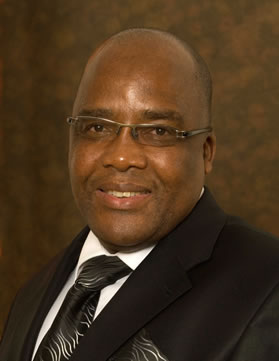 Minister Motsoaledi had been Chairperson of Hlahlolanang Health and Nutrition Education Project and a member of the Executive Council of Agriculture, Land and Environment in Limpopo’s Provincial Government. He headed the African National Congress Elections Commission for Limpopo, and was a member of the Provincial Legislature for the Limpopo Province.
Minister Motsoaledi had been Chairperson of Hlahlolanang Health and Nutrition Education Project and a member of the Executive Council of Agriculture, Land and Environment in Limpopo’s Provincial Government. He headed the African National Congress Elections Commission for Limpopo, and was a member of the Provincial Legislature for the Limpopo Province.
Dr Motsoaledi`s deeper political understanding and involvement developed while attending the University of Natal in the late 1970s. He whole-heartedly threw himself into the liberation struggle both on and off campus. He was elected to the student representative council (SRC) in 1980 and participated in the formation of the student movement AZASO to which he was elected national correspondence secretary with Joe Phaahla as president.
In 1982, he succeeded Zweli Mkhize as SRC president of the University of Natal Medical School and in 1983, he was instrumental in mobilising students in Natal for the formation of the United Democratic Front (UDF). He attended the launch of the UDF at Mitchell`s Plain, Cape Town in this capacity.
In 1989, he was elected chairperson of the Northern Transvaal Reception Committee and became deputy chairperson of the ANC Northern Transvaal (now Limpopo) region when it was launched in 1990.
Dr Motsoaledi completed his pre-medicine course at the University of the North at Turfloop. He obtained his Bachelor of Medicine and Surgery from the University of Natal in 1983.
Don't let alcohol spoil a good time
Don't let alcohol spoil a good time Estelle GreeffKnow your Minister of Health
Most of us drink alcohol for enjoyment, but for some, alcohol can become a serious problem. Alcohol is a drug, it can be addictive and is the cause of illnesses, injuries, violence, crime, abuse and motor vehicle accidents.
The festive season is a time to relax and de-stress, but sadly, it’s also a time when people tend to abuse alcohol. It is a well-known fact that within five minutes of consuming alcohol it enters the blood stream via the stomach. The effects can last for several hours. Alcohol is a nervous system depressant and after intake makes people less socially inhibited and generally more relaxed.
However, alcohol makes you less aware of what is going on around you. It affects your judgement and you are more likely to have fights, arguments, money problems, family abuse or unsafe sex. Alcohol can be the cause of slips and falls, drowning and deadly road crashes. You are more likely to take chances and do things you wouldn’t normally think of doing.
Death
After consuming alcohol, most people will become clumsy and uncoordinated and may start slurring their speech. Many tend to become emotional, known in South Africa as ‘dronkverdriet’ (drunken sadness). Drinking more alcohol could result in double vision, loss of balance, nausea and vomiting. Further drinking could lead to unconsciousness and even death.
Some people become aggressive and violent if they drink too much, or others fall into depression. It has been stated that many people who commit suicide have had drinking problems.
Getting drunk can lead to severe hangovers, stomach pains, vomiting blood, and sometimes coma and death. Alcohol may make you feel good for a while, but the dangers of abusing alcohol far outweigh those few hours of feeling gay and happy.
Choices
With the festive season upon us and socialising and partying going on all around, it is important to make choices about your consumption of alcoholic beverages.
- Never drink and drive.
- Never encourage children to drink.
- Never drink when pregnant.
- Never “binge” drink.
Don’t become a victim of alcohol and destroy your wealth and happiness.
For further information, contact the Mental Health and Substance Abuse Directorate of the Department of Health: 012 395 8000 or call Alcoholics Anonymous: 086 435 722.
Ward off the malaria bug
Ward off the malaria bug Estelle GreeffKnow your Minister of Health
Summer usually sees hot conditions accompanied by rains in South Africa’s sub- tropical areas such as along the coast and parts of Mpumalanga. These rains become the breeding grounds for mosquitoes.
Some of these mosquitoes such as the Anopheles are carriers of the deadly disease called malaria. This is spread when a victim has been bitten by this kind of mosquito.
Malaria kills more than a million people a year, most of them in Africa. Around one out of every four childhood deaths in Africa is caused by malaria. To create public awareness of this killer disease and to encourage communities to participate in malaria control programmes, countries of the Southern African Development Community (SADC) held a week-long SADC Malaria Week in early November.
Malaria areas
Malaria areas in South Africa are found in northern KwaZulu-Natal, Limpopo and the eastern areas of Mpumalanga.
You can prevent being bitten by malaria mosquitos by:
- wearing long-sleeved clothing and long trousers from dusk until dawn when you are outside
- covering exposed areas of the body with mosquito repellent lotions or sprays
- using mosquito coils, electric air repellents and insect sprays to kill or chase off the insects
- sleeping under mosquito nets
- staying in places that have mosquito screening on doors and windows.
National Health Insurance plans take off
National Health Insurance plans take off Estelle GreeffKnow your Minister of Health
Preparations for the implementation of the National Health Insurance (NHI) are taking off in full force with Department of Health’s launch of its Human Resource Strategy for Health.
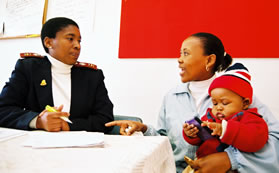 Speaking at the launch, the Minister of Health, Aaron Motsoaledi, said improving human planning, development and management was instrumental in the complete change of the health system.
Speaking at the launch, the Minister of Health, Aaron Motsoaledi, said improving human planning, development and management was instrumental in the complete change of the health system.
The new human resource plan will not only focus on training of healthcare workers, but will also see fundamental changes in the Primary Health Care. As part of these changes, the department will send nurses to various schools in the country.
Health screening
“Our initial focus will be on the poorest schools where learners have limited access to health services. The nurses and other team members will screen the pupils in lower grades for hearing, vision and dental problems. Those learners found to be in need of clinical intervention will be referred to an appropriate facility.
“In high schools, the nurses will provide health education for sexual and reproductive health, with a view to address HIV prevention and the high number of teenage pregnancies. They will also deal with other social problems such as alcohol and drug use,” the Minister said.
Specialist teams
In addition, the department will place district clinical specialist teams with the aim of improving maternal and child health outcomes at district level.
“These district teams will be made up of an obstetrician and gynaecologist, paediatrician, family physician, and an anaesthetist, all at principal level. With respect to nurses there will be a midwife, paediatric nurse and a primary healthcare nurse, all at advanced level.”
The department will also place community health teams consisting of 10 people in all the municipal wards.
Flagship projects
An amount of R1,24 billion has been set aside to repair and replace old equipment at 122 nursing colleges throughout the country. For the training of other health professionals the Department of Health has a number of flagship projects.
These are:
- a new medical school and a new academic hospital in Limpopo
- the new George Mukhari Academic Hospital in Garankua near Pretoria
- improvements at the Chris Hani Baragwanath Academic Hospital in Soweto
- the new King Edward VIII Academic Hospital in Durban with a new faculty of medicine
- Improvements at the Nelson Mandela Academic Hospital in Mthatha, Eastern Cape
- a new academic training hospital in Nelspruit, Mpumalanga.
How safe is your child?
How safe is your child? Estelle GreeffAdvice and Events
Children are often exposed to high levels of risk at home, on the road, at school and at play. As adults, caregivers and parents, we must take responsibility and make sure that our children learn, play and grow up in a safe environment without the threat of being hurt.
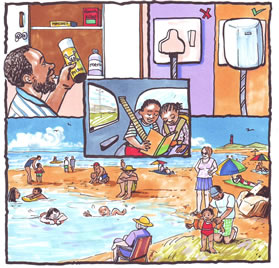 Many childhood injuries and deaths are preventable if some simple safety habits are practised. A good place to start is in the home, which is the most common place where children are injured.
Many childhood injuries and deaths are preventable if some simple safety habits are practised. A good place to start is in the home, which is the most common place where children are injured.
What you can do
- Lock all dangerous household cleaning items, paraffin and insecticides in a secure place out of children’s sight and reach.
- Lock all medicines away safely – throw away unused or expired prescription medication safely – your pharmacist will be able to assist you.
- Always supervise children in baths, around swimming pools and dams, and don’t leave open buckets of water where children can get to them.
- Hot water burns like fire, so keep all hot objects, boiling kettles and pots out of reach of prying fingers.
- Cook with care. Never leave food unattended on the stove and turn pot handles to the inside of the stove.
- Don’t leave children unattended around candles, open flames or fires, and make sure that matches are out of reach.
- Ensure electrical cables are safely secured and out of the way. Don’t run cables under carpets – they can be damaged by people trampling on them.
- Fit electrical sockets with safety plug covers.
- Lock guns and ammunition away safely, preferably in a gun safe.
- Do not leave plastic bags lying around – children can suffocate themselves.
- Get rid of old fridges, stoves and cars in the yard – they are fun places to play, but doors can easily jam and cannot be opened from the inside.
- Lock your car when it is parked and keep the keys with you. Children can easily lock themselves in, or release the handbrake and set the car in motion.
- Warn children about the dangers of talking to strangers or accepting lifts from strangers.
Affordable festive family fun
Affordable festive family fun Estelle GreeffAdvice and Events
For many of us, long hours at work are now a thing of the past; we can spend our hard-earned bonus cheque and have some fun in the sun with our loved ones.
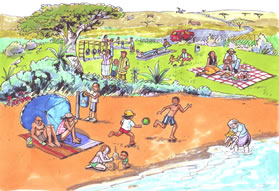 Yes, we deserve to spoil ourselves and our children after working hard for our money, but we must be careful not to get caught up in the festive season spending hype.
Yes, we deserve to spoil ourselves and our children after working hard for our money, but we must be careful not to get caught up in the festive season spending hype.
Entertaining children during the festive season need not be a major headache. There are many things to do with children that won’t cost you an arm and a leg. Most South African cities and many towns have public parks, swimming pools and nature reserves with hiking trails and picnic spots where entrance is either free or inexpensive.
Children love playing outdoors and having picnics with their friends and families. If you live near the coast, a family outing to the beach is a must in summer.
Below are a few suggestions for affordable family fun.
Eastern Cape
If you’re in the friendly city of Port Elizabeth you can reawaken the child in you by visiting Happy Valley at Humewood beach. Children will squeal with delight at identifying characters like Shrek and playing in the lush vegetation. Entry is free.
Free State
Take a walk of have picnic in the Botanical Gardens in Bloemfontein where entry is only R15 for adults and R7 for school children. Bloemfontein is well known for its roses, so you can also take a walk in the rose gardens in King’s Park.
KwaZulu-Natal
KwaZulu-Natal’s Amazimtoti beach just south of Durban promises sun and fun for young and old. Lifeguards are on duty and there is safe parking and restaurants. You can also take your children to the Amphitheatre Gardens, which boast a pond, fountains and sub-tropical plants. Entrance is free at the park located near the entrance to North Beach.
If your budget allows, visit uShaka Marine World theme park from R110 for adults and R85 for children.
Western Cape
Take the kids to the South African Museum in Cape Town, the oldest museum in sub-Saharan Africa. Entrance fees ranges from between R10 and R20. You can also visit one of the province’s scenic nature reserves or beautiful beaches, many of which provide play areas for children.
Gauteng
Take your children the Pretoria National Botanical Gardens for a picnic. The entrance fee varies from R22 for adults to R8 for children and is free for children under six. Children love zoos, so visit the Pretoria or Johannesburg zoo. Zoo Lake in Johannesburg is a perfect spot for a picnic and you can also take a ride on a paddle boat.
Limpopo
In Limpopo, you can take your family to the Mokolo Dam in the Waterberg area where you can go fishing, camping or have a braai. Entrance for day visitors is only R10 for adults and R5 for pensioners and children.
Mpumalanga
Day trips to the Kruger National Park cost R48 per person. Sanparks advises that you book on 012 428 9111. You can also visit the Botanical Gardens in Nelspruit for a stroll among sub-tropical vegetation or a picnic.
Northern Cape
Situated near Oudtshoorn, the Cango Caves is a popular tourist attraction and a must see for locals. A standard tour will cost you R69 for adults and R33 for children.
North West
Visit Hartbeespoort Dam for a braai, a picnic or a walk, view some interesting creatures at the Snake and Animal Park, go fishing or visit the arts and craft market for affordable gift ideas
16 Days of Activism: Peace in the home and peace in the world
16 Days of Activism: Peace in the home and peace in the world Estelle GreeffAdvice and Events
Violence against innocent people is a violation of human rights. In South Africa and around the world, many women and children are beaten, raped, abused and ill-treated every day.
As caring and concerned citizens, we cannot sit back and let this happen. Each and every person must play their part to stop the violence in their communities. This message comes from the Department for Women, Children and Persons with Disabilities (WCPD) through the 16 Days of Activism Against Woman and Child Abuse campaign. The campaign is a United Nations initiative, which is observed every year from 25 November to 10 December.
Human rights
This year’s theme is “Peace in the home and Peace in the world.” It serves to raise awareness of the negative impact of violence on women and children and on society as a whole, emphasising the fact that if we grow up and live in peaceful homes, we will be peace-loving people.
According to WCPD Minister Lulu Xingwana, a woman who is abused at home, cannot be at peace. “South Africa cannot attain a peaceful democracy as long as there are women and children suffering under violence and abuse.”
Speaking out
Studies have shown that the campaign has managed to increse awareness, especially in rural areas, by 33 per cent. It has also encourage and assisted more women and victims to speak out. “Women have broken the culture of violence and they are speaking out and reporting these crimes. They are no longer sitting back,” said Minister Xingwana.
A major problem in curbing violence against women and children has been fear of reporting perpetrators. To better assist victims, justice officials across the country have undergone training and awareness workshops to equip them with skills on how to deal with victims of such crimes. This has led to an increase in the number of cases that have been reported.
What you can do
- Show your support for NO violence against women and children by wearing a white ribbon – the international symbol for the 16 Days of Activism.
- Don’t keep quiet if you know someone who is abused – speak out.
- If you are a victim of abuse, you must report your abuser – speak to the police, a social worker, healthcare worker or someone you trust. If you fear the person who abuses you, you can ask the police for protection.
Violence against innocent people is a violation of human rights.
Where to get help:
Counselling and support for women and children:
- National Crisis Helpline (Lifeline): 0861 322 322
- Stop Gender-Based Violence Helpline: 0800 150 150
- People Opposed to Women Abuse: 011 642 4345
- Family and Marriage Society of South Africa: 012 460 0733
- National Network on Violence Against Women: 012 321 4959
- Childline: 0800 055 555
Legal assistance
- Legal Aid Board: 011 845 4311
- Lawyers for Human Rights: 011 339 1960
SAPS
- National Police Emergency: 10111
- Crime Stop: 08600 10111
2011 sport highlights
2011 sport highlights Estelle GreeffSport
As we bid farewell to 2011 and welcome another new year, we look back at some sporting highlights when our sports teams flew the flag high in various sporting codes.
International events where South African teams participated include the Cricket World Cup played in Sri Lanka, Bangladesh and India. Although the Proteas didn’t win the cup, they gave their all and did us proud. The national netball team, also known as Amantombazane, represented South Africa at the World Netball Championships in Singapore in July.
This was followed by the All Africa Games, which took place in Mozambique in September where South Africa collected gold and silver medals in different codes including swimming.
For the first time in the history of women’s football, the team affectionately known as Banyana Banyana qualified for the Olympics and will head to London next year where the 2012 Olympics are held. Sadly, the same cannot be said about their male counterparts, Bafana Bafana, who lost out on qualifying for the 2012 African Cup of Nations in Equatorial Guinea and Gabon by a whisker of one point.
The Springbok rugby team performed well in the Rugby World Cup in New Zealand. Although they lost by only two points against Australia in the semi-finals, they won all their other games and received a heroes’ welcome on their return.
Festive feast on a budget
Festive feast on a budget Estelle GreeffAdvice and Events
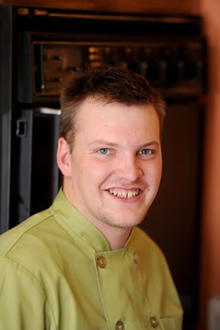 The festive season is a time when families and friends get together to celebrate the holidays. One of the traditions of the festive season is the much-anticipated Christmas lunch. Making a lavish meal can cost a lot of money, but chef Danie du Toit says there are many ways to make a delicious lunch on a budget.
The festive season is a time when families and friends get together to celebrate the holidays. One of the traditions of the festive season is the much-anticipated Christmas lunch. Making a lavish meal can cost a lot of money, but chef Danie du Toit says there are many ways to make a delicious lunch on a budget.
Chef Danie is passionate about food; he has travelled to many countries and has cooked in kitchens across the world. After completing his studies at the Institute of Culinary Arts, Danie decided to start his own chef recruitment company called Dan Dee Chefs.
Cooking has always been an importnt part of his life and he says it gives him great joy to cook for other people. “That is why I started my business; to give people a chef to cook for them while they have quality time with their families, and food being the glue keeping them together.” Chef Danie shows us how to make an affordable Christmas lunch.
Ginger ale roasted chicken
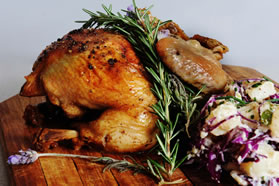 Ingredients:
Ingredients:
1 whole chicken
1 cup of homemade ginger beer or a 200ml can of ginger ale
½ an onion, chopped
½ a lemon
1tsp dried herbs
Method:
Slice the lemon in rings and mix it with the onion and dried herbs. Stuff the inside of the chicken with the onion mixture. Place the chicken in a roasting pan and pour the ginger ale all over the chicken. Season the chicken with salt and pepper and cover with foil. Roast in the oven for 30 min at 180° C.
 Remove the foil and let the chicken brown for about 10 minutes in the oven
Remove the foil and let the chicken brown for about 10 minutes in the oven
Tip: Vegetables can be added to the roasting pan before the chicken goes into the oven. You can add any vegatables like green beans, potatoes, carrots or butternut.
Potato and coleslaw salad
 Ingredients:
Ingredients:
4 potatoes
2 cups of chopped raw cabbage
1 cup of mayonnaise
½ cup of grated carrots
20 ml of lemon juice
Method:
Peel and boil the potatoes in a saucepan until soft. Once cooked, remove the saucepan from the stove and leave to cool down. Mix the cabbage, carrots, mayonnaise and lemon juice together in a bowl. Cut the potato into small bite-sized cubes and mix it into the salad. Season with salt and pepper to taste.
 Tip: Use red cabbage and fresh chopped parsley to give the salad a colourful Christmas look.
Tip: Use red cabbage and fresh chopped parsley to give the salad a colourful Christmas look.
Homemade Ginger Beer
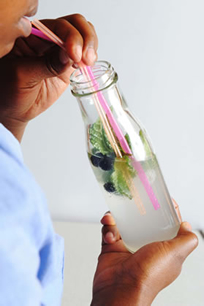 (Prepare two days before Christmas)
(Prepare two days before Christmas)
Ingredients:
1 cup sugar
1 litre of hot water
1 litre of cold water
¼ cup of chopped fresh ginger
1 tsp of cream of tartar
1 tsp of tartaric acid
10 g instant yeast
1 cup of raisins – optional
Method:
 Mix everything together and leave in an open container for 12 hours at room temperature. You may then bottle it and keep it in the fridge.
Mix everything together and leave in an open container for 12 hours at room temperature. You may then bottle it and keep it in the fridge.
Dessert: Fruit Jelly

(Start making the dessert a day before Christmas)
Ingredients:
2 cups of seasonal fruit
(use different colours if you can)
1 pack of green jelly
1 pack of red jelly.
Method:
Mix the green jelly by following the directions on the packet. Let it cool down, pour it half way into a serving dish and add one cup of fruit before it sets. Leave overnight and follow the same procedure with the red jelly, only this time pour the cooled down red jelly on top of the set green jelly and add the rest of the fruit. Leave to set.
Custard (Optional)
Ingredients:
4 egg yolks
100 ml sugar
500 ml milk
Method:
Bring the milk to the boil in a saucepan and set aside. Mix the sugar and egg yolk together in a large bowl, and slowly add all the milk while mixing. Pour the custard back into the saucepan and stir the custard on low heat. The custard will be ready when it coats the back of a spoon and you are able to run your finger through making a line through the custard.
Tip: Add some cinnamon to the custard for a great Christmas flavour.
Christmas shopping tips:
- Buy your meats at the beginning of December as the prices increase close to Christmas. The meat can be kept in your freezer and defrosted when you are ready to start cooking. Buying your meat early also helps avoid the busy shopping malls and supermarkets.
- Make a list of everything that needs to be done and when it needs to be done. Make shopping lists and decide when to prepare items.
- Always start early with food preparations for Christmas. You can start the previous day by getting all the ingredients together, preparing some of the dishes and storing them in your fridge overnight. Then start early in the morning with finishing touches to the meal. Christmas is a day to spend with your family or friends, so make sure all your cooking is done in advance to prevent you from having to spend too much time in the kitchen.
- After a Christmas meal there are always some left-overs. Use them to make a new dish. For example, you can use the left-over veggies and meat to make a pie or a stew. In this way, you won’t waste anything.
- When cooking, get everyone to help with something, even it’s just peeling or washing potatoes. They will enjoy making a contribution and it will bring everyone closer together. It will also take some weight off your shoulders and make cooking more fun.
